3 Volumes
Sociology: Philadelphia and the Quaker Colonies
The early Philadelphia had many faces, its people were varied and interesting; its history turbulent and of lasting importance.
Other Protestants
New volume 2017-04-12 19:27:47 description
Reminiscences
"The past is never dead. It's not even past." -- William Faulkner, Requiem for a Nun
A New Food and Drug Category
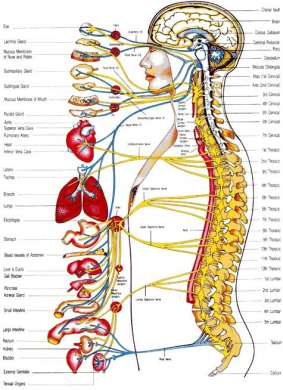
|
| Nervous System |
An editorial in the April 7, 2006 Wall Street Journal rouses a proposal germinating in my mind for twenty years, a new compassionate status of pharmaceutical regulation for dangerous but effective new therapeutic agents, not presently provided for in law.
The editorial concerned a new drug treatment for multiple sclerosis, a crippling and usually ultimately fatal condition which destroys the nervous system. In a hearing of the tests of this new drug, we hear numbers like 85% total remission. Unfortunately, we also hear of four patients who died, quite possibly from the treatment. From that point on, you could write the reports from memory. Patients come forward, declaring their willingness to run any risk to get the drug; politicians are sympathetic. The Food and Drug Administration feels forced to withhold the drug from the market until the situation is clarified; other politicians are sympathetic. We are reminded of thalidomide, which was luckily withheld from the American market until the German experience showed that pregnant women who took thalidomide could have babies without arms or legs. This lucky illustration of the value of bureaucratic procrastination gave Senator Kefauver the strength to push through an amendment bearing his name, demanding proof of efficacy, something quite irrelevant to the safety of thalidomide. Seldom mentioned is the fact that thalidomide has since proved to be quite useful for the bone cancer called Multiple Myeloma; this value took a very long time to surface, under the circumstances. The efficacy rule accomplished the purpose, however, by delaying all drug approvals, unfortunately also shortening the time left for patent coverage, and vastly increasing the cost of drugs by shortening the time on a patent to recover development costs. After thirty years of hearing the same arias re-echoing about one drug introduction after another, it begins to look unlikely that Congress will ever be able to stand the political heat which would be generated by a serious attempt to fix this problem. But surely that can't be allowed to continue forever.
Taking the multiple sclerosis treatment as an example, the patients want the drug, and their doctors want to use the drug but they don't want to be sued or prosecuted. It's almost certain that most of these patients would sign anything, accept any risk, even agree to a shortened life expectancy in return for an 85% chance of stopping the disease in its tracks. All the doctors want is to be held harmless by the courts for exercising reasonable care under the circumstances. The same is probably true in a political sense, for the FDA and Congress, who surely would be satisfied to have the doctors take the blame for any problems encountered. The drug companies want to preserve their patent protection, surely that can be accommodated. Perhaps they should be asked to contribute to a fund for the victims of unforeseen accidents; they would probably agree. What would satisfy the trial bar is less certain; they should be asked to stipulate something. As a matter of fact, anyone at all who has qualms about such a system of special defined exemptions should be asked to come forward with serious suggestions. There would then ensue a lengthy and ultimately tedious debate about details.
This would all take some time; at the end of it, someone would have to make some arbitrary decisions. But at least we could expect more progress than we have seen in the last thirty years of indecision.
A Fair Plan for Fire Insurance (and Health Insurance, too?)
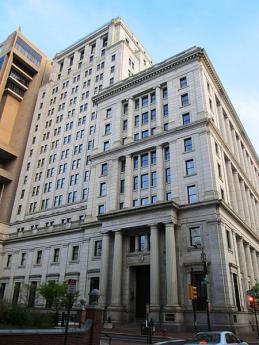
|
| Penn Mutual |
The Fair Plan (sixth and Chestnut, Philadelphia) is a fire insurance company with unusual features. Some day, it is to be hoped some scholar will write a book about the highly mixed motives of the people who created it, compared with the unexpected ways it did or did not fulfill original expectations, of both its creators and its enemies. The Fair Plan only issues fire insurance on houses, if other insurance companies have turned that house down as a bad risk. Such risky houses would normally draw higher premiums for fire insurance, but the Fair Plan insures these risky houses at normal rates. Therefore, it loses money, which is made up by the other regular fire insurance companies in the state in proportion to the business they do, obviously thus raising the price of fire insurance for everybody. But in this way, Pennsylvania guarantees that everybody can get fire insurance. Is this a good idea? Might this be a way to give health insurance to all those people who can't get health insurance? Let's talk about the Fair Plan.
We'll set aside discussion of whether the Fair Plan was a product of cynical politicians pandering for votes, or whether it was a noble gesture for fairness and equality for our poorer citizens. It very likely had elements of both motives in it, but that doesn't matter any more. It's a form of hidden taxation, of course, and it has the result of making Fire Insurance seem more expensive in Pennsylvania than in other places that do their social work with real taxes. Go too far with that, and people will end up buying their insurance in Bermuda instead of boarded-up former fire insurance companies in Pennsylvania.
As the story is now told, the regular insurance companies had a choice of taking the "substandard" applicants in turn ("Assigned Risk") or creating a new company (Joint Underwriting Association). They decided they preferred the JUA. So a company was formed which specializes in nothing but bad risks, including a few arsonists and other unmentionables, but mostly poor people in bad neighborhoods. If we are ever thinking about following the Fair Plan model in health insurance, it would run the risk of being accused of creating a two-class healthcare system. But no one seems to bring up that rhetoric about fire insurance, primarily because there is comparatively little intrusion of politics in the matter, This system is given orders to spread the extra cost of universal fire insurance out to the policy holders of all fire insurance, and it does it very efficiently, without extending its mandate into setting firefighter wages, running fire departments or repainting scorched woodwork. The fundamental decision was whether to spend Society's money this way. Once that decision is taken, the task is to do it efficiently. Notice, this is not compulsory fire insurance; it is compulsory availability of fire insurance.
After the Fair Plan had been running for ten or so years, a funny thing emerged. There were years when the Fair Plan made a profit! The fire insurance industry had absorbed the Fair Plan into their scheme of things, and felt free to increase the number of applicants they rejected, during years when money was tight or business was bad. If you had compulsory availability of fire insurance, the provision of a company which could not refuse an application made it possible for every other company to refuse when it pleased. When the economy encouraged rejection, a better class of applicant came to the Fair Plan, which made the plan more profitable. When economic conditions reversed, this reversed, and the Fair Plan again lost money. For this reason, the insurance industry is very anxious to prevent the Fair Plan from becoming political, or getting tangled up in worthy but extraneous ventures. And that's probably a good model, too, if we are considering adopting a similar system for the health insurance world: stick to your mission.
Since this simple, tested idea never seems to get into the discussion phase of present agonizing over health insurance for the uninsured, it's one clear sign that such discussions at present are not terribly serious.
Abortion
The official position of the Pennsylvania Medical Society on the topic of abortion is, we have no position on abortion. I ought to know because I was the author of this position, proposed at a moment when the PA Medical House of Delegates was obviously going nowhere. After two hours of angry debate, we had to stop before we split into two warring medical societies. The Pennsylvania delegation to the AMA was then obliged to hold the same no-position on a national level. As I recall, our position was likewise greeted by the AMA House of Delegates with great relief, and word quickly circulated in the corridors that Pennsylvania had a position everyone could endorse for the good of the organization. For several years, this no-position position was widely referred to whenever the topic threatened to arise. It almost invariably stopped the discussion in its tracks, as it was intended to do. In going back over the minutes, it would appear the AMA never actually voted to adopt a no-position motion, a discovery that surprised but did not change the basic determination to let the rest of the nation settle this. We were going to stay out of it.
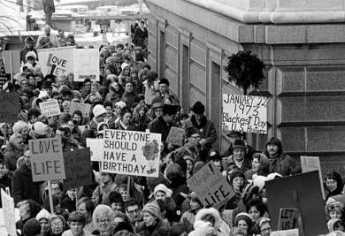
|
| Roe vs. Wade |
Because, one hundred forty years earlier, we started it. If you actually read Justice Blackmun's opinion for the majority in Roe v. Wade, as very few agitated proponents seem to have done, the original medical origin is clearly laid out. Blackmun had been a lawyer for the Mayo Clinic before his appointment to the Supreme Court, acquiring unusual medical resources and experiences for a lawyer. Now prepare for a logical leap, to the The Gross Clinic, Thomas Eakins masterpiece painting of Philadelphia's pre-eminent surgeon in a black frock coat, holding a dripping crimson scalpel in his bare hand, encapsulates the original situation. Note carefully that anesthesia is being given to the patient, but the surgeon is not wearing a cap, mask, gown, or rubber gloves.
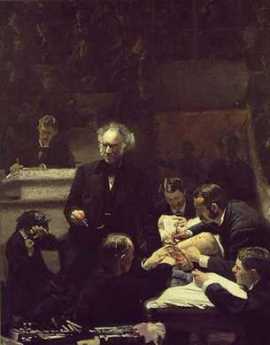
|
| Gross Clinic |
In 1850 medical science had progressed into a forty-year time window when anesthesia made abortions painless, but Pasteur had still not identified bacteria, and Lister had not devised a way to cope with them. Abortions, common in ancient Greece but forbidden by Hippocrates, suddenly were widely demanded by 19th Century women in a situation when their judgment was vulnerable. Abortions were easy to do, all right, but women died like flies from the resulting infections, and the American Medical Association was distraught about it. The Oath of Hippocrates was brought forward to emphasize its prohibition of abortion, and the performance was made unethical for a member of the Association, sufficient cause to warrant expulsion. When that proved inadequate, the delegates agreed to go to their local state legislatures and seek legislation prohibiting the performance of abortion by anyone, member or non-member of the Association. These laws were quickly passed, and it was the Texas version which was overturned by Roe v. Wade as an unconstitutional denial of privacy. Roe was a pseudonym for the patient, and Wade was then Attorney General of Texas, the officer charged with enforcing Texas law. By 1900 abortions became both easy and safe for the mother, and by 1911 the AMA had reversed its position. The scientific surgical situation is well illustrated by a later famous painting about Philadelphia surgery by Thomas Eakins, the Agnew Clinic, in which the surgical team is portrayed in its modern costume of sterile gowns and rubber gloves. But it didn't matter since by that time various churches had hardened their doctrines. Religious leaders and their constituent politicians simply no longer cared what the medical profession thought about it. For at least the following century, ideological combatants were plainly only interested in whether physician opinion might advance one side or the other of their argument with useful official statements. Our real position, if anyone cares, is that we started out seeking protection for the safety of the mother, but the issue got twisted by others into disputes about the welfare of the unborn fetus.
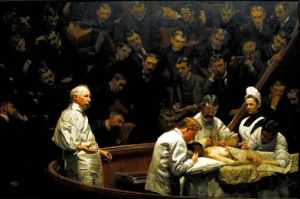
|
| Agnew Clinic |
Since this is the case, there plainly may be a reason for state legislatures to reconsider the state laws they passed in the 19th Century, during that forty-year window of time when the scientific facts were in transition. But when a leap is made by the appointed referees of the federal government to overturn state laws, even about a basically medical issue, there has to be some legal reason to intervene; a medical reason somehow doesn't count. Justice Blackmun's discovery of an unnoticed right to "privacy" in the Constitution, where the word does not appear, is just too hard for us non-lawyers to deal with. Suppose we leave the fine points of the Bill of Rights to those constitutional lawyers. What's at stake here, among other things, of course, is whether the Federal Courts are justified in overturning well-intentioned state laws which had served well for at least fifty years -- simply out of impatience with the sluggishness and political timidness of state legislatures to revise obsolete laws. That's unbalancing the Constitution for a comparatively minor cause. Even major cause is something we have agreed to adjust in other ways, by amendment, not judicial opinion. And that's my opinion, having comparatively little to do with abortion.
It Ain't Necessarily So
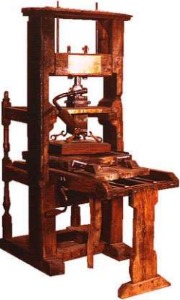
|
| Benjamin Franklin Print Press |
The Protestant Reformation provoked a wide variety of reasonings, and the Quaker position is at one extreme of them. One way of looking at it is to see the Reformation as largely a reaction to the invention of the printing press. At first, there was the impact of Latin versions of the Bible, or Vulgate, which could be read by priests like Martin Luther, and possibly interpreted by them to vary from established Church doctrine. Translation of the Bible into common languages subsequently permitted educated parishioners to read the Bible for themselves and draw their own conclusions. Fundamentalist branches of the church tend to place almost total reliance on what they can read for themselves, and consequently, authenticity is highly important to them. The Quakers go a step further, encouraging each member to come to his own spiritual viewpoint ("There is that of God in every man."), using the Bible as merely one important resource. Although others sometimes regard them as spiritually adrift, the Quaker idea is that if something is really true, everybody who thinks hard about it will eventually come around to much the same conclusion. (Related to this attitude is a strong belief in the ultimate triumph of democracy, and the essential rightness of market-set prices.) Some people try harder than others, of course, and they come to be regarded as "weighty" Friends, likely to have reached the correct conclusion somewhat sooner than others.
One very weighty Friend was Henry Cadbury, an American relative of English candy makers. Henry decided he wanted to spend his life teaching the Bible and went to Harvard Divinity School. He became in time the leading authority in the world on the Book of Acts, editing that section of the Interpreter's Bible, and rising to be Professor of Divinity at Harvard. Henry knew his stuff, so to speak.

|
| Henry Cadbury |
One fine summer day, Henry was seated in the front row of the Haddonfield Meeting. Birds twittered outside the open doors and windows, but otherwise, the gathered meeting was entirely silent. It was even beginning to look as though this meeting would be one of those occasional instances when nothing is said for an entire hour -- a "silent meeting". But, no, a visitor came through the open back door of the meetinghouse, in response to the sign found outside almost every meetinghouse, "All Are Welcome". The man was evidently a fundamentalist, and seeing a large audience all sitting silently waiting for something, he advanced boldly to the front of the meeting and began to speak.
The Bible was the Word of God. Every word in The Bible was true -- literally, and incontestably true. The theme was repeated several times, without an apparent response from the audience.
Finally, Henry Cadbury stirred himself. "Well, it has always struck me...". Oh, oh. Look out, here it comes.
"It has always seemed to me, that the most quotable parts of the Bible, are mainly based on the faulty translation."
Kenneth Gordon, MD, Hero of Valley Forge

|
| Valley Forge |
There's no statue of Ken Gordon at Valley Forge National Park, although it would be appropriate. No building is named after him; it's probable he isn't even eligible to be buried there. But there would be no park to visit at Valley Forge without his strenuous exertions.
One day, Ken's seventh-grade daughter came home from school with the news that the father of one of her classmates said that Valley Forge Park was going to be turned into a high-rise development. That's known as hearsay, and lots of things you hear in seventh grade are best ignored. But this happened to be substantially true. At that time, the Park was owned by the Commonwealth of Pennsylvania, and Governor Shapp was finding the upkeep on the Park was an expense he needed to reduce. The historic area had two components, the headquarters area, and the encampment area. One part would become high-rise development and the other would become a Veteran's Administration cemetery. Although any form of rezoning has the familiar sound of politics to it, Dr. Gordon (a child psychiatrist) had the impression that Sharp was mostly interested in reducing state expenses, and had no particular objection to some better use of the historic area. At any rate, when Gordon went to see him, he said that he would agree to a historic park if Gordon could raise the money somehow. The Federal Government seemed a likely place to start.
Well, the sympathetic civil servants at the National Park Service told him how it was going to be. You get the consent of the local Congressman (Dick Schulze) and it will happen. If you don't get his consent, it won't happen. It seemed a simple thing to visit that Congressman, persuade him of the value of the idea, and it would be all done; who could refuse? After the manner of politicians, Schulze never did refuse, but somehow never got around to agreeing, either. It takes a little time to learn the political game, but after a reasonable time, the National Park employees told Gordon he was licked. Too bad, give up.
He didn't give up, he went to see his Senators, at that time Scott and Clark. They instantly thought it was a splendid idea, and instead of going pleasantly limp, they sent Citizen Gordon over to see Senator Johnson of Louisiana, the chairman of a relevant committee. Johnson also thought it was a great idea, and called out, "Get me a bill writer!" A bill writer is usually a government lawyer, tasked with listening to some citizen's idea and translating it into that strange language of laws -- section 8(34), sub-chapter X is hereby changed to, et cetera. Bill writers have to be pretty good at it, or otherwise, they will misunderstand the intent of the original idea, modified by the personal spin of the committee chairman, the comments of the authorizing committee, and later bargains struck in the House-Senate conference committee. Having negotiated all those hurdles, a bill has to be written in such a prescribed manner that it won't be found to have multiple loopholes when it later reaches the courts in a dispute. A good deal of the time of our courts is taken up with making sense of some careless wording by bill writers. That's what is known as the "Intent of Congress", an ingredient that may or may not survive the whole process.
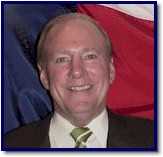
|
| Dick Schulze |
Ken Gordon had to go through this process, including testimony at hearings, for three separate congressional committees. To get everybody's attention, he organized several hundred supporters to write letters and get petitions signed by several thousand voters. These supporters, in turn, influenced the media and started a lot of what is known as buzz. All of this is an awful lot of work, but there is one thing about this case that can make us all proud. Not once did a politician suggest a campaign contribution was essential in this matter.
In time, ownership of the Park did in fact migrate from the Commonwealth to the U.S. Department of the Interior, hence to the National Parks Service. Everyone agrees it has been well managed, and increasing droves of visitors come here every year. It is now clearly a national treasure. Unfortunately, the encampment area got away and has been commercially developed, although not nearly as high-rise as originally contemplated. Along the way, many discouraging words were spoken about the futility of fighting against such odds. The outcome, however, is the embodiment of two slogans, the first by Ronald Reagan. "It's amazing what can be accomplished, if you don't care who gets the credit for it." The other slogan is older, and Quaker. All you need, to accomplish anything, is leadership. And leadership -- is one person.
One day Ken Gordon, the very busy doctor, was asked how much of his time was taken by this effort. His answer was, ten hours a week, every week for five years.
Lewis Harlow van Dusen, Jr. (1910-2004)
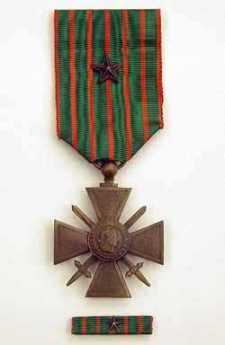
|
| Croix de Guerre |
Lew van Dusen was one of the great story-tellers of a story-telling city. In one continuous lunch conversation he could string together personal anecdotes about Lloyd George, Lawrence of Arabia, William Bingham, the making of the hydrogen bomb, the Croix de Guerre (which he had been awarded), Nicholas Murray Butler, several Supreme Court Justices, Harvard Law School (where he led the class), and on and on until the waitress would just go ahead and clear the table. He even told of his own great suffering as a boy sitting at proper Philadelphia dinners, where it was a firm rule that acceptable topics of conversation were limited to the Wimbledon lawn tennis matches and the sinking of the Titanic.
When the landmark U.S. Supreme Court case of State Oil v. Kahn came up for arguments, he and I rode together on the Metroliner down to Washington, stayed at a club there, and after the hearing took the train back to Philadelphia. During the entire time, Lew never stopped talking, and his voice was very loud. There was the time in Macao when a retired British diplomat came up to him and said he knew the history of every gravestone in the cemetery for foreigners, except five, and two of those names were on the letterhead of Lew's firm (Drinker, Biddle and Reath). Drinker, it turns out, was American consul and discovered that all of his guests were poisoned by the cook. He traveled all night, getting stomachs pumped out, but not his own, and died the next morning from the poison. Biddle, on the other hand, was also a physician interested in Yellow Fever and died of it when he contracted the disease from one of the subjects.
There was the time when he was the young guest of Nicholas Murray Butler at a luncheon with British Prime Minister Lloyd George. "Tell Mr. Roosevelt," said George, "That Social Security is nothing but a dole."
And the time when King George gave everybody the day off on his 25th Anniversary as King, so they played cricket. His teammate was Lawrence of Arabia, and after the game, Lawrence hopped on his motorcycle and rode off down the road to be killed. Lew was the last person to see Lawrence alive.
Well, when you get to the Supreme Court, the public stands in line on the steps, out in the rain. But the lawyers go around to the back door, where there are a lounge and a lunchroom. Inside two minutes, Lew was surrounded by lawyers as he told more stories. One of them tugged my sleeve and asked, "Is that who I think it is?" I said I supposed so, although who he had in mind is still a mystery to me.
State Oil turns out to have been as important to antitrust law as we supposed it would be; the fine points of vertical integration were afterward explained to me. And finally, I was told how, when he was chairman of the Ethics committee of the American Bar Association, Lew's committee caused the ABA to reverse its long-standing opposition to cameras and audio equipment in courtrooms. The effect of this has been slow, but gradually courts are permitting the televising of trials, and eventually they probably all will permit it. But not yet the U.S. Supreme Court. Non-lawyers still stand in the rain outside, and if there are no seats left inside, too bad.
Lin
Lindley B. Reagan, M.D.
July 16, 1918 -- September 10, 1995
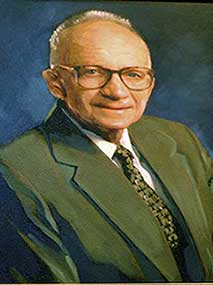
|
| Lindley B. Reagan, M.D |
The first and oldest hospital in America, the Pennsylvania Hospital at 8th and Spruce Streets, always had a strong Quaker flavor but a unique medical tradition as well. Since it was the only American hospital for decades, later becoming the home hospital of the first medical school in the country, it impressed its ideals and traditions on the whole of American medicine. However, it imposed so many difficult demands on its trainees that a century or more of an evolving profession simply moved away from copying it. It was, in 1960, the last hospital in the country to begin paying its resident physicians anything at all, one of the last privately controlled American hospital to adopt a billing and accounting department, and one of the last if not the last to regard a handful of private beds as merely a convenience for the patients of the staff physicians. In 1970 its method of maintaining inventory was to notice that the supplies on the shelf were running low, and ordering some more. It was founded in Benjamin Franklin's words, for the "sick poor, and if there is room, for those who can pay," and could only survive into the late 20th Century through private donations and the freely contributed services of the doctors, student nurses and administration. No amount of money could induce people to work as hard as they worked. You might say this was the only aspect of Medieval monasteries which Philadelphia Quakers thought worthy of imitating.
Somewhere in this set of ideas was the treasured concept of a rotating internship, preferably two years long, prior to entering specialty training through a residency. In 19th Century Vienna, it was a matter of rule that an intern was just that, physically confined within the walls for the term of service, and a resident was just that, someone who lived on the campus. The Pennsylvania Hospital had no such rule, but since it paid the doctors nothing for five or six years of eighty-hour weeks, their poverty forced them to satisfy the Viennese rules by default. Entertainment was bridge or poker in the intern quarters, conversational chit-chat was a description of bizarre cases or peculiar patients, a weekend "off-call" was a good time to catch up on correspondence. There were student nurses around, of course, but the matron was a pretty no-nonsense chaperon. Every class of interns contained one or two millionaires by inheritance, but peer pressure made them nearly indistinguishable in the daily routines. Aristocrats' main value to the resident physician community was their access to the ruling families in the city, and hence to the governance of the hospital, in case governance should occasionally abuse the vulnerability of the trainees.
I find in retirement that most of my colleagues are now willing to tell stories of the "old days" which they were unwilling to tell at the time. Over several glasses of the finest single-malt in a walnut-paneled club, one such story recently surfaced. It concerned Lin.
Lin was a member of an old Quaker family, surprising everybody during the Second World War by volunteering as a junior physician in the Navy. He was assigned to a marine regiment in the Pacific Theater and went through some of the most murderous fightings on Iwo Jima and Guadalcanal. Our grapevine reported that the enlisted Marines in his outfit absolutely worshipped him, and I easily believe there was a lot of quiet heroism behind that gossip. He told me he had decided to become an internist while in the Pacific, but somehow only a surgical residency was available when the War was over, so he took it. He was probably the best internist on the staff, and it showed in his conduct of surgery, where it sometimes matters more what you decide to cut than what you cut. He always looked exhausted, but never hesitated to drive himself another hour when the situation demanded it. One day, he had to excuse himself from an operation, an almost unheard-of event, and testing his own urine, found it loaded with sugar. So, the soft-spoken Quaker internist who was primarily doing surgery had to add the burden of insulin injections to his load. If he ever complained about that or any other thing, no one could remember hearing it.
At about the third glass of single malt, the story came out. My old friend, like the rest of us, had to spend a year as a surgical intern during the two-year rotating internship; he hated surgery and didn't mind telling the world. At the moment in question, he was the assistant at some neck surgery, with Lin performing the actual surgery. He was told to take a long pair of scissors and cut off the excess strands of sutures after Lin tied the knots; that was known as trimming the ligatures. They were working deep in the crevices of the patient's neck. Lin held up the loose ends of the knot and ordered, "Cut". My friend inserted the long scissors into the hole and snipped -- accidentally cutting right through the jugular vein.
As would be expected, a fountain of blood came up out of the hole, and Lin stopped it by putting his thumb on the cut ends of the vein. "Well," said Lin, "I guess we'll have to fix that." And did.
With tears in his eyes, my octogenarian friend cried out to the startled clubroom. "God bless you. God bless you, Lin."
Perhaps the point isn't clear to those who didn't go through the process, so let's be more explicit. Both my friend and I worshipped Lin, as a person, a teacher, and a surgeon. He was the perfect agent for his patients, without the tiniest trace of conflict of interest, income-maximizing or whatnot. He was as technically skillful as it is useful to be, but he was the thinking man's surgeon as well as the utterly faithful servant of the best interests of the humblest patient. He was, in the opinion of his closest professional associates, the best surgeon in the world. In need of surgery ourselves, all of us would have flown the Atlantic to have him operate on us. For reasons of his own, he was to spend the forty years of his professional life in a small country town with a small hospital, scarcely a famous surgeon but a beloved one to his community. Over the past sixty years, I have had a number of opportunities to know many surgeons who would be in contention for the title of the best surgeon in the world. Some have written books, some have struggled successfully upward through vicious competition, some of them would be called "Rainmakers" if the research world followed the pattern of lawyers and architects. One or two have won Nobel Prizes for surgical innovations, but that's different from being the best surgeon around. The best surgeon in the world was Lin, faithfully plying his trade in a little town that could not possibly know how lucky they were.
Odessa, Delaware
Delaware is a pretty small state to be divided into two civilizations, and in fact, it seems safe to predict that division will soon become meaningless. New Castle County and Wilmington are up north in DuPont country, with more Ph.D.'s than anywhere else in America, chateaux in the suburbs, plenty of Porsche's and other elements of the finer life. The other two counties, "South of the Canal," are rural, marshy, or beach front. Wal-Mart country. Aside from a distinct difference in the weather patterns, all of this is destined to change, and soon. A limited-access toll road, probably mostly intended to carry people to the slot machines of Dover Downs, makes it breezily simple to go from one end of the state to the other in an hour. A ferry from Cape May to Cape Henlopen makes sailing across the mouth of the bay a shorter simpler way to go from the urban areas of New York to and from Washington, Norfolk and points South. And changes in the tax laws make Delaware a great place to avoid sales taxes, estate taxes, business taxes, usury laws and lots of other things. That brings in businesses, and they, in turn, will bring in a swarm of home builders. It looks very likely Delaware will go the way of Luxembourg, urbanized from border to border.

|
|
The Corbit-Sharp House Built in 1774 Located in Odessa, Delaware. |
Little Odessa (population 280) sits right at the pivotal point in this transformation. Here is the very narrowest point of the peninsula between Delaware and the Chesapeake bays. In the Seventeenth Century, there was only a five-mile portage from the head of one creek to the head of the other; the town there was called Cantwell's Bridge. Just why the two Delaware-Chesapeake canals were built a few miles further North is an engineering question, but they tended to shelter Cantwell's Bridge from Northern influences. The neck was so narrow, however, that the road couldn't avoid the town, and for a century it was a pleasure to find a little Colonial town, a little Williamsburg so to speak, popping up among the fields of clover bordering a drive to Dover. A few miles to the West, a very fine boy's boarding school adds to the tone of the place, and it's only a short 9-mile commute to the University of Delaware. The finest 18th Century country house, the Corbit-Sharp House sets the tone for the area, and Christmas season in Odessa is quite memorable. Rodney Sharp was the son of the local school teacher who acquired financial substance, private jet airplanes and all that, on the other side of the canal, and then restored his old home the Corbit house into the Corbit Mansion, bringing the whole farm village up to an elegant level. A visit to Odessa at Christmas, touring the open houses and visiting the festivities, is well worth the trip.
You have to hold your breath to see what is going to happen to real estate in the area. The toll road sweeps around the edge of Odessa, and now the people going to the slot machines and the beaches can hardly see it as they race past. But that's mostly weekend traffic, and during the week all of those cornfields are quickly turning into easy commuter villages, full of McMansions. They are going to fill up the schools, demand better ones, demand traffic signals to protect the kiddies, demand retail outlets for all those upscale stores with catalogers, demand to be noticed. Eventually, all those three-car families will choke up the toll-road, and it will become a great big congested parking lot at rush hour. Sad.
One final comment about the origin of Odessa. It's named after the city in Russia because both of them were wheat exporting cities at one time, although it is doubtful if they were ever comparable in the steamy nightlife. However, the one in Delaware is actually the older of the two. Cantwell's Bridge, Delaware was founded in 1731. For reasons unclear, its name was changed to Odessa in 1845, perhaps in the mistaken idea that the Russian city was where Odysseus once landed. That's what many Russians claim, but the place they have in mind was really in Bulgaria. The place the Russians call Odessa was founded by Catherine the Great in 1794, some sixty years after Cantwell began collecting toll at his bridge in Delaware. When the Bulgarian mistake was pointed out to Catherine the Great, she wouldn't change the name; she sort of liked it that way.
Pink Slips for Green Doctors
This little story of discarded pink slips, even after fifty years have elapsed, is on the short list of things I am proud of. I probably remember it so well because it was the forerunner of several other seemingly unrelated matters.
In 1956, I was the Chief Resident Physician of the Pennsylvania Hospital. That position doesn't exist anymore, but most hospitals at the time had a Chief Resident, who was in charge of the house officers, the interns, and residents. The Chief Resident was usually a doctor who had just finished his formal specialty training and was thinking about starting a private practice. He was the father figure to the doctors still in their post-graduate training years, all of them overworked and tense, concentrating on avoiding dangerous mistakes while learning to assume new and difficult responsibilities. He was old enough to carry the weight of authority but young enough so the residents could talk to him frankly, and still call him by his first name. The Chief Resident had his office and secretary near the accident or receiving ward, next to the resident's lounge, which contained mailboxes and coat hangers. The lounge was pretty shabby, as bachelor lounges tend to be, but it was all doctors, all the time, coming and going. If you wanted to know what was going on, this was the place to learn it.

|
| Pink Slip |
Tom Paton, the credit manager, had his office further down the hall. In spite of his occupation, he was a jovial, convivial fellow, a former rugby player and soccer referee who fit right in with the lounge crowd. One day, I noticed he was throwing away a large stack of pink slips. He seemed surprisingly eager to tell me all about it. These slips represent the lifeblood of the hospital, sez he, without the flow of cash we would have to close the doors of the institution. Well yes, Tom, but taking care of the sick folk is sort of important, too. After a little explaining, I had to agree that he was talking about an interesting subject.
One of the everlasting problems in any hospital is to have the bill ready at the time the patient goes home. Nowadays, hospitals all have databases and many gigabytes of computing power, but the patient's bill is never ready when the patient is discharged and may take weeks to be sent to them. Hospitals put on a good face, don't you worry about the bill, madam, we trust you and we'll send it to you when you are feeling better. And all that, but the truth is they haven't a clue what your bill is.
All of that drove Tom Paton nearly crazy. The time to collect a bill is when the tears are still hot. Every day you delay the bill costs you a provable fraction of it, and so on. So, the system was devised that the tabulating machines of the hospital would routinely work all night to produce a bill for everybody, every day. If they went home today, they were handed a bill. If they didn't go home, the bills were thrown away. For accounting purposes, a carbon copy of each bill was kept on pink paper. It was an amazingly simple idea, far less expensive than the random-access real-time whatchmacallits that nowadays do a far less effective job, and are out of commission much of the time. Let the record show that in 1956, every single patient at Nation's First Hospital got his bill as he was leaving, any time night or day. IBM charged us eleven hundred dollars a month to rent the machines, which also did the payroll and inventory systems.
An idea occurred to me. If you are only going to throw them away, could I please have the pink-slip copies of the bills of the patients who did not go home? Those patients are still in the hospital, and these slips show how much cost each patient is in the process of running up. So a system was established that my secretary got these pink slips every day, and put them in the mailbox of the doctor taking care of the patients. It was a simple thing to do, but the reaction it got was explosive.
At first, the interns thought I was warning them, or criticizing them, but they soon got over that. We were all appalled at the costs which were being generated and particularly appalled when a patient stayed a little longer than necessary. In those days before Medicare, any unpaid costs had to be made up by contributions and private endowment. The house officers and the student nurses who did most of the work received no salary. The sense of guilt that arose from looking at those bills was very strong, and it was obvious that every one of them went back to the wards to try to speed things up. Since they all left their training to practice in various communities for fifty years, I like to believe that the multiplier effect was significant.
In those days, we had a two-year rotating internship. Every month before rotating to a new service, each intern would summarize the remaining patients on his ward for the benefit of his successor. In doing so, they were able to reflect in retrospect how each case could have been speeded up a little, and therefore wouldn't still be here to require a summary. There is an invisible counter-pressure at work. From a doctor's point of view, most of the heavy work of each admission to the hospital is concentrated in the first couple of days. You get things into motion, and then sort of watch it rolls out. But if your ward is full, you can't get any new admissions, so your day suddenly gets a lot easier. Just let one of them go home, and bingo you have a new one. This little human frailty affects every one of them to some degree, and each one thinks he may have discovered this hidden incentive to slow discharges, except on the last day of the month. It was my job as Chief Resident to keep the system from sludging up. As much as for any other reason, an increased turnover meant more cases per intern, and therefore more training and experience. That's what most of them thought I was up to when I started handing out the pink bill copies. It really wasn't purposeful at all, it was just sort of an accidental discovery of something useful.
From that, I developed an interest in efficient use of hospitals, a subject we called utilization review. Through the County Medical Society, I formed a club of other doctors at other hospitals who had the same interest. When Senator Bennett of Utah got a law enacted, this organization turned into the Philadelphia Professional Standards Review Organization, which became part of the Pennsylvania PSRO, and eventually a national one whose name has changed several times. We had some interesting battles at the AMA House of Delegates, which dissolved into insignificance when the national business organizations took matters into their own hands and used their control of employer health insurance to push HMOs, Health Maintenance Organizations, onto the hapless public. Public outrage about HMOs put egg permanently on the face of national business, but the matter is now worse, not better.
What I got out of all this was an enduring interest in computers, which has served me well for half a century. And a sense of outrage bordering on apoplexy whenever some well-meaning activist declares that the doctors are responsible for pushing up hospital prices to enrich themselves in some way.
Please Don't Lose Any Sleep Over This
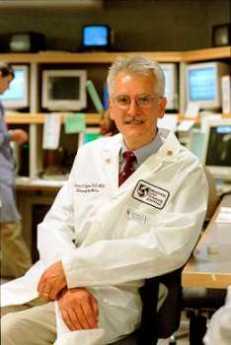
|
| Dr. Charles Czeisler |
The Institute for Experimental Psychiatry Research Foundation meets alternatively in Boston and Philadelphia, in recognition of its rather complicated historical relationship with Harvard and Penn. The Spring 2005 trustees meeting was held in Boston, with Dr. Charles Czeisler of the Brigham and Women's Hospital making a presentation of his work with sleepy resident physicians. Sleep is now a central focus of the work of the Institute, particularly the effect of lack of sleep on performance. Resident physicians are a group with lots of experience with sleep loss, so much that such experiences as residents are central imprinting in the lifelong brotherhood of the profession. The public tends to regard the torment of protracted craving for sleep as some kind of dangerous hazing inflicted on professional newcomers by sophomoric seniors. Every once in a while, someone gets hurt by these games. That seems to be a general public reaction. For the most part, by contrast, members of the profession who have themselves undergone the experience turn away silently from such unfeeling remarks. As the old contraceptive joke about the Pope has it, if you don't play the game, don't make the rules.
In the first place, it is wrong to suggest that resident physicians are somehow helpless victims of authority, abused slaves of somebody's profit motive, or warped masochists enduring the process in order to inflict it on someone else. Perhaps the example of my classmate Seibert is useful. As a freshman medical student, Seibert was so overwhelmed by the volume of facts he was expected to learn, that he decided to give up sleep entirely. Seibert, by the way, was no moron; he was an honors graduate of a very selective Ivy League university. And he actually did stop sleeping for more than two weeks until he collapsed and had to be stopped. This was his own choice, gamely adopted in spite of general ridicule. And to show that overachieving is not limited to physicians, there was my oriental patient, the daughter of the President of her country. She related that as a graduate student she did not go to bed for three years; during all that time, she sat at her desk, slapping her face to keep awake. What we are talking about here is a self-selected group of committed and dedicated people, perhaps overly shamed by the specter of failure.
The work of our Institute has helped document and understand the injurious effect of sleep loss on performance; no one can go very long without sleep before responses and vigilance begin to deteriorate. A great many vehicle accidents are caused by drowsy drivers; it is a concern that pilots of airplanes on long-distance flights are to some provable degree less competent to land the plane. Therefore, it is not completely surprising to find that interns on protracted duty do make 20% more errors in medication orders, and nearly 50% more diagnostic errors. It is jarring to discover a measurable increase in the number of intern auto accidents, particularly when driving home from work. Maybe we ought to pass a law about it.
Commiseration is one thing; proposals to interfere are quite another. For one thing, the time-honored protection against the harm of this problem is redundancy. The complex, fast-paced and dangerous environment of a hospital, like that of an airline cockpit, has very little tolerance for lack of vigilance. Our solution has been to do everything three times, with overlapping responsibilities and repeated opportunity for catching errors before they get through to the patient. Although the malpractice lawyer seeks to pin the whole blame on some person, particularly one who is covered by insurance, the reaction of doctors to adverse events is to presume that at least three people must have cooperated in letting it slip through. At night and on weekends, the reduced staff tends to weaken the defensive network. But by every assessment, the greatest threat to our protective screen of redundancy is cost control. Any manager of managed care can find duplication and overlap in ten minutes of searching for it in a hospital; redundancy is a big factor in the high cost of running a hospital. The law of decreasing returns will dictate that it becomes very expensive to eliminate the last one percent of errors. To state it in reverse: it is very tempting to save a bundle of money in a competitive world, by accepting only a small increase in the errors. Since it is a matter of opinion, physicians are grimly determined that it shall be physicians who strike that balance. Those who press for more punitive treatment of physicians in the matter of errors should reflect that it surely will convince physicians to flee the risk of responsibility for the decision of where to strike the balance.
If you bend metal repeatedly it will crack; if you stretch a rope too hard it will snap. These unfortunate events are not called errors, and it is improper to search for blame in them. The medical profession is aghast that the public does not seem to appreciate that average life expectancy has increased by thirty years in the past century. That's not ancient history; life expectancy has increased by three years in the past ten. A system that produces a result like that is entitled to a certain amount of tolerance for its errors if we must call them errors. In other environments, that's known as pushing the envelope. Anyone who thinks it's fun to stand on your feet for thirty-six consecutive hours -- hasn't tried it.
Surgeons are perhaps somewhat more conscious of the need to train young professionals to drive themselves beyond ordinary endurance. After all, if an operation is unexpectedly prolonged, the surgeon can't just quit, he must finish. Neurosurgeons, with their fourteen-hour procedures, are particularly vehement on the topic. But it is true of every physician, too. When the telephone rings in the middle of the night, will this young fellow haul himself out of bed, or will he tell the patient to take an aspirin and call again in the morning? Increasingly, we hear complaints from patients that other doctors didn't even take the trouble to examine them; the implication that we are somehow not like that is very flattering. Part of the training is forbearance, too. At three in the morning, it is very easy to feel sorry for yourself and to reflect that an administrator with four times your income is home in his nice warm bed. The fact is, that if the person who is up and on his feet doesn't do the job, no one will.
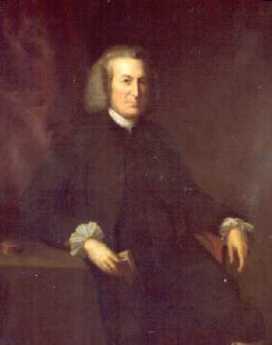
|
| Cadwalader |
Some incomprehension from bystanders must simply be endured with patience. Beyond that, it could be futile to seek a complete understanding. Quite recently, I was explaining to a young lady in a tailored suit who Thomas Cadwalader was. His portrait, beneath which we were standing, hangs in the great hall of the Pennsylvania Hospital. Although he died in 1789, Dr. Cadwalader is still famous for his remarkable, unfailing courtesy. A sailor in a tavern on Eighth Street once waved a gun and announced to the crowd he was going out the swinging doors to shoot the first man he met. The first man happened to be Dr. Cadwalader, who tipped his hat and said, "Good morning, sir." So, the sailor shot the second man he met.
The young lady in the tailored suit brightened up. "The moral of that story, " she said, "Is always wear a hat."
Preppies of the Future?

|
| Sir Peter Hall |
Modern western civilization had its origin, or revival if you prefer, in the Italian town of Florence six or seven hundred years ago. The rise and fall of Florence makes a case example for the two preeminent scholars of civilizations, Peter Hall and Arnold Toynbee. Both of them, for obvious reasons, are British. Toynbee intones the theme that civilizations destroy themselves by overextending their best features. Peter Hall makes that into less of a one-way street. Civilizations flourish in the first place because of competitive tension between two conflicting aspirations; eventual victory by either one starts success on a path of unrestrained decline. In slightly different ways, both of them predict that success leads to failure. Not that failure inevitably follows success, but those notable failures are usually caused by success.

|
| Florence |
Florentine civilization grew out of the interaction, conflict, and intermarriage, of pugnacious aristocrats with sly calculating merchants. For a time, an optimum balance was achieved, and Florence dominated the Western world. Centuries later, much the same thing happened to England as feudalism grappled, first with Elizabethan maritime buccaneering and subsequently with the Industrial Revolution. That's where Eton comes in.

|
| Eton |
For American purposes, it is enough to focus on two Etonian mottos. Lumping both reckless aristocrats and scheming merchant princes, Eton exists "to exert a civilizing influence upon those who are destined to rule." Eton expresses no pretense about diversity or talent; Eton is not a trade school, a place to make useful contacts, or an elevator for upward social mobility. Labor governments, of course, do not share such attitudes, enduringly defended by Wellington's proclamation, that "The battle of Waterloo was won on the playing fields of Eton." That school aspires to teach more than Latin or trigonometry; it teaches duty and courage. And, as needed, it works. The graduate of a similar school Winston Churchill, reminding the nation that never have so many owed so much to so few, was delivering a subliminal illustration that leadership grows from education in many different ways.
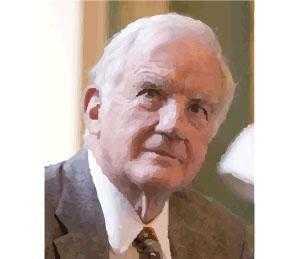
|
| Derek Bok |
So things had not changed much in several hundred years, from Florence to Eton. It became accepted that a nation needs leaders who are smart (no charges of Light Brigades, please), it also needs unflinching bravery, in various combinations at different moments. And then, a research institute very near Lawrenceville, New Jersey, and two Harvard presidents, Conant and Bok, added a new requirement just before the Second World War. By devising multiple choice tests whose results seemed to parallel later academic success in college,
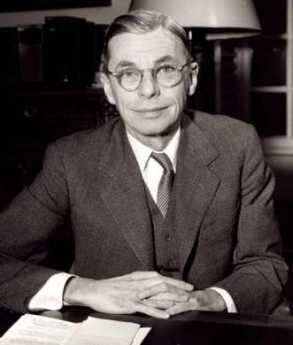
|
| Conant |
it became possible to identify myriads of ordinary American children who seemed to have equal or greater potential than the children of wealth and success. If the leadership pool needs to be enlarged, that's where new entrants should come from. Besides, examples have always abounded of the children of famous people who, even with an outstanding education, bitterly disappointed their expectations. Perhaps, by the application of scientific testing combined with judicious financial aid, it might be possible to civilize the unmentionable social Darwinism long visible in competitive concentrations of hormonally active youth. Without being too obvious about it, perhaps we could create a race of supermen by placing genetically superior candidates of both sexes together, train them well, and let propinquity do the rest. As this tacit system has evolved over nearly a century, the inbreeding has come to depend less on the hidden factors which encouraged success in the parents, and more on whatever genetic skills are linked to adolescent success in multiple-choice examinations. And the expansion of this idea into the unused talents of girls is genetically thwarted by the tendency of professional women to have fewer children by delaying the birth of the first child; a sort of reverse Darwinism induced by prizing professional talents over reproductive ones.
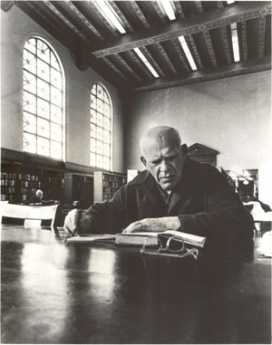
|
| Eric Hoffer |
The American pragmatic way, and the scientific method, both attempt to make decisions by seeing what works. Eric Hoffer, the San Francisco writer, once visited Lawrenceville and pointed out one thing that definitely works. Rich men, he said, marry beautiful women. And so, their children tend to be unusually handsome. It's a circular system that is undeniably at work. Without any conscious scheming by sociologists, an unnerving pragmatism is already at work getting more of whatever it is we need, into leadership positions. Unfortunately, this fiendishly clever system for influencing the genetic choices of promising candidates cannot unequivocally claim to produce long-term success. Like the British royal family, it seems to some the proportion of failed marriages is too high in our system, the incidence of recreational drugs and alcohol is too great, and the number of graceful drifters too numerous among the alumni. Perhaps that is only invidious opinion, based on contrasting unusual opportunities with the ultimate consequences for a fundamentally normal collection of people. Perhaps, if we were truly objective, we might discern a second-generation production of Nobel Prize winners, Senators, Presidents, Olympic champions that might well justify the opportunities bestowed on the bloodlines. What Lawrenceville may need, to defend itself, is a systematic longitudinal study of outcomes that would demonstrate, let us say to Princeton, that more of our graduates are entitled to admission there. Or, maybe, that's the wrong goal entirely. Perhaps graduates of Lawrenceville, Andover and Exeter don't need Yale, Harvard and Princeton . Perhaps they need a different sort of college. Maybe they should skip college entirely, and go on to graduate schools. Instead of being preparatory schools, perhaps they should be finishing schools. There was a time when rich men married beautiful women; the time is coming when beautiful women seek out nerds to marry. Society has not charged academia with a duty to promote such an outcome, once suggested by Bernard Shaw to the beautiful chorus girl. "What if we produced children with my looks and your intellect?"
Or, perhaps a longitudinal study would show something even more important, best perceived by ones who passed through the system before there was a SAT. Perhaps the basic premises of the SAT score need to be confronted, along with the cerebral ideals of Presidents Bok and Conant. Perhaps, beyond a certain point, higher SAT scores just lead to more schizophrenia and depression, or other counter-productive outcomes of inbreeding. Perhaps we should have another look at J. P. Morgan's system for identifying leaders. That old walrus-nose swept schoolishness away. "Brains don't make you rich," he snorted. "Character does."
REFERENCES
| A Study of History Arnold J. Toynbee ISBN-13: 978-0195050806 | Amazon |
| Cities in Civilization: Peter Hall: ISBN-13: 978-0394587325 | Amazon |
| Why the Private School?: Allan V. Heely: ASIN: B000GR1QS2 | Amazon |
Remember This Date: May 18
 Delaware Bay is teeming with successive migrations of seafood. May 18 is a pivotal day, give or take a few days. 
|
| Dr. Fisher |
A group of Texas and California friends were recently led on a two-day tour around lower Delaware Bay, down the New Jersey side to Cape May, ferry ride to Lewes on the Delaware side of the bay, and then home. The timing of this adventure had more to do with azalea and dogwood season than wildlife, but the date chosen was very fortunate: May 18.
It just happens that May 18 is the last day of the shad season. That's dictated by Mother Nature of course, but it also has a lot to do with Dill's Seafood in Bridgeton. For almost a century, this wholesale seafood store has dominated the shad business in the region. At one time, they shipped six thousand pounds of shad daily in season, although in recent years the business has dropped to five hundred pounds a day. Even today that's a lot of fish, supplying boned shad and roe to every restaurant with shad pretensions for a hundred miles around. They do have a restaurant attached, with pitchers of cold beer on the table, and enthusiasts in great numbers.
The source of this monopoly is a very large family of Italian sisters, who have developed the skill of de-boning shad in about thirty seconds. Shad are just about inedible with the bones intact, and most amateurs make a mess of the matter if they try to de-bone the fish themselves. As the supply has dwindled, few people develop the skill needed to compete with these ladies, and the seafood industry has just surrendered the field to them. Although shad have been successfully transplanted to Oregon, the fish is native to the Atlantic Coast, and my Western visitors had never heard of them. What's really special is to fry or bake the half-pound roe sacs, with bacon of course. Shad roe with bacon and beer, now there's really something to talk about. Shad start to "come in" in January, and the last day of the season, the very last day, is May 18.
We then took a forty-minute ferry ride from Cape May to Lewes Delaware, thirty minutes out of sight of land. The reports in the taprooms of Lewes were that no one had yet seen any horseshoe crabs, it was apparently too early for them. But we had passed the point of no return, so we went on to Slaughter Beach. The origin of the name of this beach is obscure as far as local residents are concerned, although it is fun to remember that these were pirate coves in the Sixteenth Century. Captain Kidd, no less. It is also the place where salt water generally turns fresh, depending on the season and the rainfall, a matter of great importance to migrating fish who tend to hang up here in great abundance.
Well, May 19 turned out to be the first day of the season for horseshoe crabs, so our luck was doubly fulfilled. These terribly ugly brown rascals are about the size of a dinner plate, with a long pointed tail, and they come tumbling in on the surf upside down and sideways. Thousands of them are coming, but on the first day, there was a pair of them every six feet or so. This is the famous limulus, which is really more closely related to scorpions than crabs. The tail doesn't seem to have poison, but it is razor-sharp as my younger son discovered when he picked one up by the tail to throw him (?her?) back into the ocean. He got a deep bloody gash for his reward.
The Limulus isn't edible, but it has its uses. It has four eyes, each attached to a single large nerve fiber, making it very useful for ophthalmology and neurology experiments. Its blood is blue since it uses copper instead of iron in its hemoglobin. That hasn't been put to any use, but the blood has a peculiar ability to clot when it comes in contact with bacterial toxins and has proved very useful for identifying toxic bacteria.
As far as amateurs are concerned, the horseshoe crabs attract a mob of seagulls, but we are assured that these are very special birds who take off from South America months earlier. They are said to arrive almost precisely when the crabs do and love to eat the eggs. One female crab produces twenty to fifty thousand eggs. As you approach the line of feasting birds, the near ones take off but the others remain, so the edge of the flock recedes as fast as you approach it. The vacated beach is peppered with the backs of the half-buried crabs, quite touchingly paired off, two by two. Inevitably, the question is raised how a male tells which one is a female. And inevitably the reply is, "That's his problem."
School Vouchers (7)
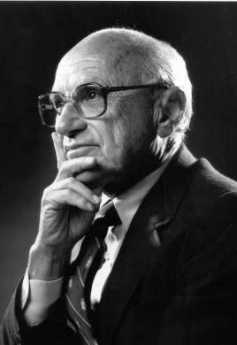
|
| Milton Friedman |
S chool vouchers might seem unrelated to the struggle to enact Medical Savings Account legislation, but Milton Friedman June 9, 2005 article in the Wall Street Journal suggests that resistance to both ideas comes from the same source. That's appealing, so let's quote the Nobel Prize winner at length. He's speaking of the 23-year interval since the publication of Paul Copperman's book A Nation at Risk:
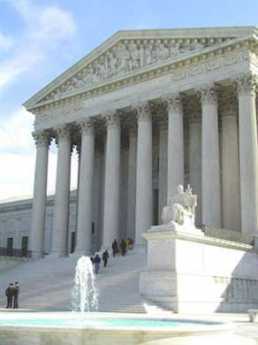
|
| Supreme Court |
"Throughout this long period, we have been repeatedly frustrated by the gulf between the clear and present need, the burning desire of parents to have more control over the schooling of their children, on the one hand, and the adamant and effective opposition of trade union leaders and educational administrators to any change that would in any way reduce their control of the educational system.
"We have been involved in two initiatives in California to enact a statewide voucher system(in 1993 and 2000). In both cases, the initiatives were carefully drawn up, and the voucher sums moderate. In both cases, nine months or so before the election, public opinion polls recorded a sizable majority in favor of the initiative. In addition, of course, there was a sizable group of fervent supporters, whose hopes ran high of finally getting control of their children's schooling. In each case, about six months before the election, the voucher opponents launched a well-financed and thoroughly unscrupulous campaign against the initiative. Television ads blared that vouchers would break the budget, whereas, in fact, they would reduce spending since the proposed voucher was to be only a fraction of what government was spending per student. Teachers were induced to send home with their students misleading propaganda against the initiative. Dirty tricks of every variety were financed from a very deep purse. The result was to convert the initial majority into a landslide defeat. This has also occurred in Washington state, Colorado and Michigan. Opposition like this explains why progress has been so slow in such a good cause.
"The good news is that, despite these setbacks, public interest in and support for vouchers and tax credits continues to grow. Legislative proposals to channel government funds directly to students rather than to schools are under consideration in something like 20 states. Sooner or later there will be a breakthrough; we shall get a universal voucher plan in one or more states. When we do, a competitive private educational market serving parents who are free to choose the school they believe best for each child will demonstrate how it can revolutionize schooling."
Milton Friedman thus advocates three things: Medical Savings Accounts, School Vouchers, and channeling public funds directly to citizens rather than to the institutions which serve them. As an economist, he seems primarily interested in breaking up the financial integration of government and institutions, with school vouchers as a demonstration. As a physician, I was mainly interested in the advantages of Medical Savings Accounts themselves. The theoretical advantage of keeping governments and institutions at financial arms-length was for me only a helpful navigational guideline.
Antitrust agencies have been uneasy for a century about this matter, which lawyers call "vertical integration". The U.S. Supreme Court has repeatedly pondered vertical integration between corporations and suppliers, but so far has drawn back from prohibiting it. The State Oil case suggests the Court perceives such economic concentration is so commonly harmful to the participants that most will learn to avoid it without legal interference. The possibility, after all, does exist that in some circumstances integration might be of some value to the public. Along those lines, an argument could be advanced that paying hospitals directly reduces administrative costs, as compared with sending bills to preoccupied patients. Or the management of hospitals might be more flexible if revenue comes in periodic government payments without economic and seasonal volatility. These and other arguments against the MSA might be examined on their merits, but such arguments have almost never been discussed.
Medical Savings Accounts and school vouchers have encountered the same sort of bewildering guerrilla warfare. Warcries abound, but rarely plausible arguments, and never direct negotiation. Since both proposals are just paperwork reforms, their well-intentioned advocates more astonished at the virulence of the opposition than disposed to imitate it. Somebody is protesting too much. That's all we could see. The common issue between the two reform proposal is whether government funds should flow directly to institutions, or whether it may also flow to individuals, who would then choose between competing institutions. Furthermore, the opponents of reform, which we would have to suppose are the institutions themselves, seem bitterly opposed to any experiments or demonstration projects, as if they recognize that the economic facts will undermine their resistance.
Seventeenth Amendment

|
| Seventeenth Amendment |
The Seventeenth Amendment of the Constitution provides for the direct election of U.S. Senators; prior to that, the states could decide for themselves how to select their Senators. The Amendment was proposed in 1912 and ratified in 1913. Today, most people have no opinion whether the Amendment was good or bad, necessary or unnecessary. The Progressives of 1912 professed to be shocked, shocked, that wheeling and dealing went on in the state legislatures every time there was a vacancy in the Senate. Indeed, few contestants on TV quiz shows would be able to tell you what the Amendment was about. It would be hard to find a person who would, without further study, be opposed to a reaffirmation of "The Senate of the United States" shall be composed of two Senators from each State, elected by the people thereof, for six years; and such Senators shall have one vote. The electors in each State shall have the qualifications requisite for electors of the most numerous branch of the State legislatures."
If you search for reasons -- why in the world would there be a fuss about this topic, 125 years after the "Constitutional Convention -- several plausible reasons are stated, all of them amounting to legislature incompetence. Such as deadlocks resulting in vacancies remaining unfilled, influence by corrupt political organizations and special interests through the purchase of legislature seats, and neglect of duties by legislators because of politics. Even though news of these matters has failed to persist in the national recollection, they seem plausible enough; it sounds like local politics, all right. But the plausibility was there in 1787, too, and surely the founding fathers expected something like that when they let the States select their Senators as they pleased. The whole idea surely was to give the states additional reassurance that they could block any further transfer of state power to the federal government; direct election of senators clearly reduced the power of state governments in the federal/state struggle. Mostly, of course, by the State Legislators selecting one of their own members to go to Washington.
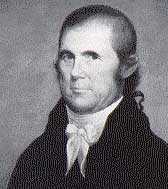
|
| John Marshall |
We have here a tilting of our governance from a Republic toward a Democracy, following the philosophy of John Marshall, of all people, that the behavior of all State legislatures everywhere will inevitably lead to mischief. Just a minute, please, let's give this a little thought. Surely the vast amounts of campaign money required to run for a Senate seat compare with the amount a special interest would have to spend to buy a majority in the Legislature of a State. As a practical matter, most special interests have lost interest in State politics and spend their money in Washington -- except for those few special interests that are exclusively State regulated. This comes down to the insurance and real estate industries, with insurance only there because of the McCarran Ferguson Act. This isn't only because of the Seventeenth Amendment, it also has to do with Franklin Roosevelt's Court-packing attempt, which is discussed elsewhere.

|
| " Plato" using Leonardo da Vinci as model. |
The idea of a Republic, originally set down by the Greek philosopher Plato, was that a small group of elite philosophers (you will have to forgive his professional biases) who meet together occasionally, would be better able to pick a member of their group for higher responsibilities, than would the populace. The inner circle would know who was an alcoholic, a phony, a pervert, a coward or a loafer, whereas these qualities can be concealed from mass audiences long enough to get elected. Such an in-group in a legislature may pick a bad person, or deliberately reject a good one, but they do it on purpose, not because they are fooled. The issue of direct election of Senators comes down to whether you think it is more likely that a legislature will be corrupt, or the voting population will be ignorant. Hard choice.
Meanwhile, election to the State legislature has been reduced to an inconsequential backwater, almost guaranteed to have an adverse effect on the members. There was a time when people who wanted to be U.S. Senator knew they must first run for the Legislature, where their skills could be tested and perfected. National affairs became State affairs, with legislators well aware that they could unseat a Senator whose national behavior displeased them. There are many States, Pennsylvania among them, who collectively pay far more federal taxes than they receive in federal benefits. Call it pork barrel if you like, the present degree of interstate wealth redistribution could not possibly continue at present levels if we repealed the XVII Amendment.
The Coming Baby Boomer Retirement Problem
 In a few years, the baby boomers will retire and two things will happen. They will have to retire later in life, and the country will have to borrow money to pay for the rest. 
|
In 2004, the Nobel Prize in economics was shared by Edward C. Prescott and Finn E. Kydland, for advancing the concept that business cycles are caused as much by what people expect to happen as by what actually does happen. By this reasoning, myriads of individual decisions are constantly made in the direction suggested by simple undeniable truths. What truths face us? Demographic facts related to how many people have already been born, and how fast they are dying, force everyone to acknowledge that both Social Security and Medicare are seriously underfunded. Consequently, it seems inescapable that the boomers must work longer and retire later. To whatever degree they don't, the country must go deeper into debt.
Prescott, writing in the December, 2006 Wall Street Journal, stated this truism slightly differently to reach the next step: the national debt must increase. Increasing the national debt raises interest rates, which is good for savers. At the moment, the main savers are American retirees and foreign governments. However, the bond market is and always has been a zero-sum game. What's good for American retirees is bad for American business. And mortgage-holders. And everyone else who is in debt. Higher interest rates, which are seemingly inevitable, encourage saving and discourage borrowing. Prescott seemingly welcomes those features, because he is remarkably cheerful about the inevitable coming demographic crunch.
There are at least two things about it which should be bothersome. The first is that the boomers will not be borrowing money from their own generation but from their children. Getting the chance to live longer than their parents, they seemingly want to retire at the same age or earlier, asking their children to pay for the unearned twenty-year vacation. Boomers simply must be shamed into later retirements. The American Gross Domestic Product has a long term growth rate of about 3% per year; 2% of that total comes from increased productivity, about 1% from population growth. Extending domestic working years has the same economic effect as, say, illegal immigration; it's good for the whole country to make this nativist substitution.
The other disturbing consequence of borrowing our way out of debt is the effect on banks. That's harder to explain, but the interest rates we have been describing are long-term rates, established by the world marketplace. Short-term rates are independently set by the Federal Reserve to control (or "target") inflation, and currently they are higher than market-set long term rates. Any sensible saver will therefore use moneymarket funds rather than buy bonds. That's mostly bad for banks because their profit largely derives from "borrowing short and lending long". The so-called inverted yield curve, then, is good for old folks and bad for banks. If the Treasury fails to issue enough long term bond debt, or the Federal Reserve fails to issue enough short-term debt, banks are in danger of going broke. To summarize the whole puzzle, the government clearly will become more deeply indebted, but it must preserve a proper balance between short-term and long-term borrowing. Otherwise, either a bank crisis or inflation will sink us.
As a guess, I would say that banks are the likeliest to fail. They are in precarious condition anyway because of wrenching changes in technology. And they are in the process of discrediting themselves by failing to pass along the currently soaring short-term rate bonanza to the public. Just compare your own money-market interest rate with the 5.25% which the Federal Reserve has dumped on the banking system, and see if your blood doesn't boil a little. If this pick-pocketing continues much longer, banks will be in a bad public relations position when they must come to the public with hat in hand.
So, there's only one defensible response to this demographic retirement problem. The baby boomers, having been handed several years of unexpected longevity, must spend a portion of it working longer.
Advanced Placement Gains Attackers and Defenders
An abridged extract of what

|
| Naomi Riley |
Naomi Schaefer Riley writes in the October 6, 2006 Wall Street Journal, follows:
"... The rat race complaint is that AP courses put a strain on students-too many facts to memorize, too much reading. And teachers complain, too. They say that AP courses force them to teach to test.. .
"Conceived in the early 1950's by educators from three prep schools (Andover, Exeter, Lawrenceville) and three universities (Harvard, Princeton, Yale),
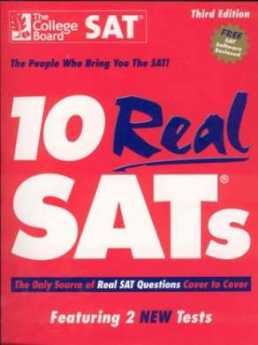
|
| SAT's |
the AP curricula demand that students acquire real knowledge. Unlike the SAT's which measure mental aptitude, the AP tests ask students hard questions on the history exam require students to place quotations and documents in their correct context and to identify events, dates, historical figures, and ideas....
"Why? Because college increasingly offers a crazed social experience at the expense of rigorous study. But high school does better: It is often the last time that students are forced to learn something...."
Ms. Riley goes on to imply that colleges have deteriorated into little more than binge drinking hide-outs. Since I am 62 years away from personal observation of the college scene, I can't comment or even know for certain whether things have changed much in this respect.
But on the topic of resistance to Advanced Placement, Ms. Riley explains enough to justify comment. The SAT revolution, which took place at the same time and much the same place, effectively converts the old college entrance based on genetic probabilities into the new college entrance based on mental aptitude. Since raw mental aptitude seems to be in oversupply, the final decisions are winnowed by extra-curricular success. It would appear to me that the extra-curricular success industry is threatened by proofs of academic achievement. And more importantly, since grade inflation has destroyed the value of high school transcripts, the AP courses serve as a surrogate for effective nerdiness and bookishness. In other words, the AP tests are a threat to the entitlements created by the SAT, one of which is grade inflation.
If grade inflation is under attack, that puts more pressure on high school teachers to teach, school districts to raise their salaries, and taxpayers to pay. Before that happens, there will be pressure to cut the cost of sports and other extracurricular expenses.

|
| Bill Gates |
And, come to think of it, if more nerds are admitted to prestige colleges, perhaps their social inadequacies will reduce college socializing that now appears to alarm, Ms. Riley. For proof of that trade-off, I enclose a photograph of some overachievers of 1978, two of whom dropped out of Harvard because it was unchallenging. Mr. Gates is lower left, Mr. Allen lower right.
Beginning Social Security Benefits
 Some should start benefits before age 65, others should delay it for ten years or more 
|
| Dr. Fisher |
BY mail or visit to the local Social Security office in your neighborhood, it is possible for anyone to determine how much you can expect to be paid in benefits, and at what age. In fact, it is a wise precaution to ask for this information every few years, just to be sure your payments are being credited properly, since hundreds of millions of payments are flowing into many millions of accounts, and you want to get things straight before years of problems accumulate. In the early years of the program, one of their biggest problems was that a great many people used the sample numbers on the illustration card instead of their actual "Social".
Assuming payments from your employers have been flowing properly, you currently have the option to retire at the age of 62 and start getting reduced benefits. You will get three extra years of payout, but you may need to pay income tax on some of it, and the payout will be less. More recently, the standard age to begin payments was raised to age 67, gradually phased in. And more recently than that, the payments became taxable for some people, with offsets for Medicare reducing it. Better check where you stand. My Pennsylvania Dutch uncle used to say it was bad arithmetic to take the money early. But my Scotch-Irish accountant advised everybody to take the money as soon as possible, because money in your pocket is real money, while future payments depend on your living long enough to get them, and just might depend on who was elected President. Who knows, you might get hit by a truck tomorrow. So, ultimately any decision about this matter is based on opinions which differ since the sanctity of contracts is fast becoming a quaint anachronism.

|
| Social Security Benefits |
However, the arithmetic is available, once you know a few facts. The longer you wait, the larger the monthly payments will become. However, you can count on about 3% inflation during the interval so the money might have less purchasing power. Some of the monthly payment will be free of income tax, some of it will be taxable at whatever your tax rate might be. If you spend the money, it's gone; but if you save it, it will grow at an after-tax rate which may or may not be greater than if you leave it with Social Security until you need it. The arithmetic isn't very hard, but if you look around on the Internet, somebody surely provides a fill-in-the-blanks tool which will calculate it for you.
If the arithmetic or your personal situation is such that you aren't going to spend your Social Security check as soon as you get it, here's what you do. Arrange for direct deposit into a world index fund, total market. Historically, that will grow at 8% compounded annually and will pay about 1.8% taxable dividend. Now, do the math again, and see if you are better off leaving it with those nice folks on Social Security Boulevard, in Baltimore, instead of those nice folks at Vanguard or Fidelity.
The whole theory behind this maneuvering is that many people have half-time jobs or dual incomes, or income from the sale of a house, which means that for a few years after they retire they have more income than they will have later in life. For them, there is a choice between the two methods of saving Social Security money for the time in life when they need it. Other people need every cent they can get, right now. If you are one of the lucky ones, try to be even a little luckier by using arithmetic and choosing between the options. If you are hit by a truck, it really won't matter what you do, so try to be an optimist.
Contemporary Germantown
The Strittmatter Award is the most prestigious honor given by the Philadelphia County Medical Society and is named after a famous and revered physician who was President of the society in the 1920s. There is usually a dinner given before the award ceremony, where all of the prior recipients of the award show up to welcome to this year's new honoree.
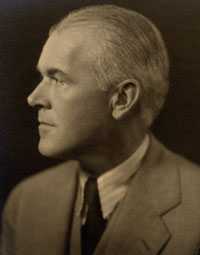
|
| Bockus |
This is the reason that Henry Bockus and Jonathan Rhoads were sitting at the same table, some time around 1975. Bockus had written a famous multi-volume textbook of gastroenterology which had an unusually long run because it was published before World War II and had no competition during the War or for several years afterward; to a generation of physicians, his name was almost synonymous with gastroenterology. In addition, he was a gifted speaker, quite capable of keeping an audience on the edge of their chairs, even though after the speech it might be difficult to recall just what he had said. On this particular evening, the silver-haired oracle might have been just a wee bit tipsy.
Jonathan Rhoads had likewise written a textbook, about Surgery, and had similarly been president of dozens of national and international surgical societies. He devised a technique of feeding patients intravenously which has been the standard for many decades, and in his spare time had been a member of the Philadelphia School Board, a dominant trustee of Bryn Mawr and Haverford Colleges, and the provost of the University of Pennsylvania. Not the medical school, the whole university, and is said to have been one of the best provosts of the University of Pennsylvania ever had. When he was President of the American Philosophical Society, he engineered its endowment from three million to ten times that amount. For all these accomplishments, he was a man of few words, unusual courtesy -- and a huge appetite in keeping with his rather huge farmboy physical stature. On the evening in question, he was busy shoveling food.
"Hey, Rhoads, wherrseriland?". Jonathan's eyes rose to the questioner, but he kept his head bowed over his plate.
"HeyRhoads, Westland?" The surgeon put down his fork and asked, "What are you talking about?"
"Well," said Bockus, "Every famous surgeon I know, has a house on an island, somewhere. Where's your island?
"Germantown," replied Rhoads, and returned attention to his dinner.
Dinner With Hoffa
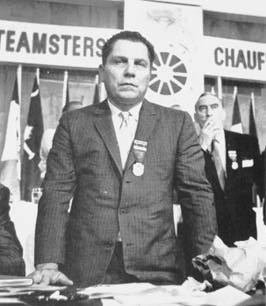
|
| Jimmy Hoffa |
Although she lived for twenty more years, in 1975 my mother was eighty years old. Nevertheless, she did not display the slightest surprise, or hesitation in answering, "Sure", when asked if she would like to have dinner with Jimmy Hoffa. One of her constant pleasures was to be doing things that other women couldn't match.
The Philadelphia County Medical Society's Center City branch was having dinner, and the program chairman had the main goal in life of attracting speakers who would bring an overflow audience. Jimmy Hoffa, the former president of the Teamsters Union, recently released from prison, certainly filled that description; one of the members of the branch had a patient who was a teamster official who happened to know that Jimmy would love to speak to the doctors about medical care in prisons. Not only was he willing, but he also paid his own expenses to fly up from Florida to give the speech. As by far the oldest lady present, my mother was not to be denied when she demanded to be seated at the head table.
Hoffa was indeed a charming person and an able proponent of his cause. He had experienced medical care in a prison, he felt mistreated, and the doctors in the audience were sympathetic to what they suspected was quite true. They generally began that evening with conflicting opinions, because it is generally known that doctors in the prison environment are often threatened, and occasionally harmed. We know quite well how reluctant the Legislature is to spend one cent on a group of people they dislike, and how they all wish the problem would just go away. By the end of the evening, Hoffa held his audience in his hand. No wonder he rose to the top of his organization.
Well, the impact of the evening was certainly heightened, even in my mother's view, by the fact that two weeks later Hoffa just disappeared, and there have been hundreds of books and articles written about his probable grisly murder by the Mafia. The latest is called I Heard You Paint Houses, in which one Frank Sheeran is quoted as claiming, or even boasting, that he had been the hit man. I wouldn't know. The title, however, is reliably known to refer to all the blood which is found splattered about, following a mob rub-out. Calling them wise guys is quite apt.
The reawakening of this topic by the book does raise some other old questions of the highest rank. Reviewing the evidence, it is possible to believe Hoffa was not guilty of precisely what Bobby Kennedy was accusing him of. At least, the prosecution failed to convince one jury of it. The FBI records do seem to indicate that J. Edgar Hoover offered him evidence of the questionable Kennedy private lives, which Hoffa refused to use in his defense in the trial. And there seems to be little doubt that he worked hard to elect Richard Nixon, or that Nixon later commuted his sentence. Generally speaking, he was on the side of the angels concerning Mafia influence in the Teamsters Union. But his strange relationship to Nixon and the Kennedy family is quite another matter, although equally obscure.
Flexner Report, Revisited
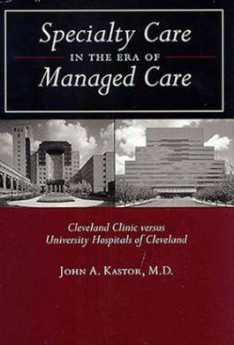
|
| Specialty Care In The Era Of Managed Care |
Book Review
Specialty Care In The Era Of Managed Care
Cleveland Clinic
versus
University Hospitals of Cleveland
John A. Kastor, M.D.
0-8018-8174-9
The Johns Hopkins University Press
Abraham Flexner's 1910 Report practically canonized the notion that medical schools must be owned by universities. Forty years later, Dwight Eisenhower firmly disagreed. Asked why ever would he give up the pleasant life of Columbia University president to get into the nastiness of national politics, he replied, "The White House doesn't run a medical school." During the same era, Secretary of State Dean Acheson and Senator Robert Taft, political enemies but personal friends, were riding to New Haven together to a Yale trustee meeting. The two agreed it was unfair for 40% of university budget to be spent on 1% of the student body, and decided Yale should get rid of its medical school. Their subsequent motion failed by only one vote at the meeting. And as a final Flexner footnote, Princeton University which shrewdly never owned a medical school, is now nonetheless in the news over the central underlying discordance -- managing huge sums which, either by contract or donor restriction, are inflexibly assigned to a single department, thus substituting the donor's priorities for those of the University president. Medical school ownership of teaching hospitals raises the same issue except in reverse. It is politically impossible to treat an affiliate as a cash cow without learning the harsh reality of the Golden Rule: the affiliate with the gold will promptly remake the rules.
Understanding these issues but seldom emphasizing them, John A. Kastor has done us all a great favor by studying and publishing the unseemly disorders which result, in many cities and institutions. His particular focus in this book is on Cleveland, where all that matters medically is the prospering Cleveland Clinic and its struggling rival, Case Western Reserve. The book is mainly focused on a particular question: under managed care, should teaching hospitals adopt the Cleveland Clinic's style and organization, in order to prosper as they do? In the end, he cannot quite bring himself to recommend it. Essentially, the Clinic is run by doctors, for doctors. The clinic pays salaries, but (so far) bills fee-for-service. The over-reimbursed procedural specialties such as surgery subsidize the under-reimbursed cognitive specialties (prompting East Coast colleagues to sneer at "organized fee-splitting".) Cleveland's Clinic, like all group practices, must devise strategies to a)induce acquiescence to the subsidy of internists by surgeons, b)discourage physicians from starting competitive practices in the neighborhood or c)turning their salaried incentive into an instant 40-hour week. Not everyone will submit to what is between the lines, most notably at the Clinic's Florida satellite. But since the alternative is to hire non-physicians with concealed animosities to doctors to run hospitals and medical schools, all physicians who actually treat patients must give the physician-run group practice model some thought based on experience with its alternative.
We all have an unfortunate tendency to assume that weakness of character is the main cause of the executive misbehavior so widely observable in all corporate environments. In the medical world, a much more powerful force is generated by shifting quirks of reimbursement. Once the pecking order is established between hospital and school, medical school and university, it gets violently upended by the underdog suddenly getting riches from the Senate Finance Committee, then upended again by Ways and Means a few years later. Or bureaucrats in Rockville, in Baltimore, or the Executive Office Building. Eisenhower was wrong, the White House does run medical schools and hospitals when they would very likely be better run by physicians. In fact, Flexner's offhand interposition of the University into this dogfight seems a little quaint. Just to mention the indirect residency reimbursement program, the institutional research overhead allowance, the old cost-plus reimbursement of hospitals, the institutional patent revisions, is to start a list which can get to be quite long. In most of these cases, an institutional component which needed to be subsidized in the past has now become prosperous and is asked to return the subsidy. The chief executive is then caught between duty to his institution, the threat of investigation if funds shifting is suspected, and his own sense of fairness. That these upheavals are so frequently pacified without serious harm to the patients, is a credit too seldom given.
Dr. Kastor's writing is somewhat hampered by a need to footnote, document and defend everything he says. Nevertheless, the book will be read by physicians like a novel with a great many villains. It's encouraged reading. One hopes that the next book in the Kastor series will examine the Florida satellite clinics of the Cleveland Clinic and of the Mayo Clinic, one making money and the other losing money. Maybe some basic issues of an effective medical organization can be resolved by making different comparisons.
But don't expect permanent axioms to emerge; Medicare Risk contracts are coming. Under capitated systems, administrative incentives are slanted to discourage expense, especially expensive surgical procedures. Perhaps group practices will soon face a need to have their internists subsidize their surgeons, reversing the traditional arrangement. The threat to collegiality, so evident in this book, is destined to continue.
Further Acknowledgments (2)
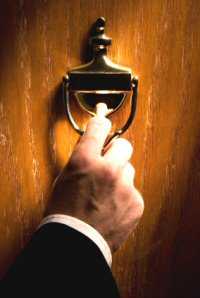
|
| Knocking on the door |
There were some flurries of interest in the article, letters to the editor, passing comments from colleagues in the corridors of my hospitals, and even a challenge, readily squelched, from a hospital administrator who wrote in that it wasn't true. Perhaps the most flattering response was to meet the magazine's editor for the first time at a cocktail party twenty years later and have him exclaim a little about the stir it made.
Then, on July 3, there was a knock on my office door. Howard Sandum, the new publisher of Saunders Press, two blocks away, had read the article, proposed we have lunch. The substance of his visit was that, if I could write a book between the Fourth of July and Labor Day, he would publish it. I wasn't sure I was capable of writing a book in 90 days, had planned a vacation at the Jersey shore with my family, didn't know what to do. But I also didn't know that Howard was planning on moving in on us at the shore, and as fast as manuscript appeared, it was edited, at all hours, night and day. The marathon effort was greatly assisted by using my new computer, a Radio Shack TSR-80, with a processor speed of 2 GHz. Howard could type a hundred words a minute, but when I predicted that in a few years every book would be written with a computer, even he uneasily granted that maybe I had some kind of the point. My present computer is approximately a thousand times as fast on the processor level, although not noticeably faster on the author level. Today, a publisher won't even look at a manuscript unless it is on a computer disc.
My next hero was Thomas Donlon, at that time Washington correspondent for Barron's, now Editor-in-Chief of the Editorial Page. Donlon didn't remember me at first when I sat next to him lately at a luncheon, but in 1969 he did me the honor of writing a two-page book review, including the mind-exploding remark that I was a Renaissance Man. There is absolutely nothing in the whole world I would rather be called than A Renaissance Man, however inaccurate that description may be.
Well, a book can go through doors that the author wouldn't be allowed to go through. A week or so after Barron's book review, I was sitting quietly in my easy chair, deciding whether to shave and get dressed, when the phone rang. A voice said, "This is the White House calling."
State Capitol Think Tanks
 States rights will be neglected as long as state governments remain so second-rate. 
|
Setting aside one's political party preferences, it is hard to deny the considerable increase of new and sophisticated ideas generated by the Republican party in the past twenty years. For fifty years before the Reagan Revolution, it was quite the reverse. All of the bright new ideas -- good and bad -- seemed to bubble out of the Democratic Party, while the Republicans just sulked and muttered. Even when Eisenhower swept the Democrats out of power, he was mostly riding a crest of idea fatigue. Leave us alone for a while. Thirty years before that, Harding came into office promising a "Return to Normalcy". The country does occasionally get fed up with pesky innovation, but for nearly a century we became accustomed to ideas ("reform") coming from the left, resistance coming from the right.
Yes, the pendulum does swing back and forth spontaneously. And yes, Adolf Hitler inadvertently stirred the American intellectual pot by chasing the Austrian school of economics to our shores, primarily landing at the University of Chicago. Nevertheless, a case can be made that it was the establishment of a number of think-tanks in Washington which brought conservatism to life as a positive force. The model was already in place, at the Brookings Institution and the Institute for Advanced Study in Princeton. In each case, a very wealthy man decided to endow an institution for the promotion of ideas congenial to himself or his religion. In the case of Bamberger the department store mogul, the think tank was mainly created to house one man, Albert Einstein. While Bamberger and Brookings were liberals, their model was copied by Otis at the American Enterprise Institute, Coors at the Heritage Foundation, Koch at the Cato Institute.
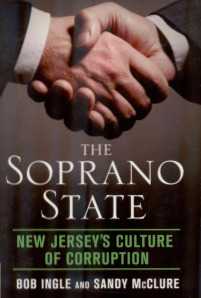
|
| class= |
It does not seem to have occurred to the existing think tanks that one of their favorite ideas might be accomplished internally, within the think tank world itself. That idea is devolvement of power from centralized Washington to the fifty various state governments. Anyone can see, on any weekend, that urban Washington DC has outgrown its blood supply. The traffic jam out on Fridays is matched by equal paralysis on Monday morning as the crowd returns to work. In spite of a splendid highway system, designed at least in part with emergency evacuation in mind, the place is both unlivable and dysfunctional as a place to work. Twice each week, the Southern half of the East Coast is cut off from the Northern half by this gigantic traffic jam, just as effectively as if Generals Lee and Grant were conducting battles there. Components of one administrative department are cut off, not only from other departments but from other components of the same department. The headquarters of the Department of Health and Human Services is eight miles away from the National Institutes of Health in Bethesda, and thirty miles from Medicare headquarters in Baltimore. The headquarters of the whole country is cut off from the rest during the working week and essentially deserted on weekends. The need to decentralize the federal government in some way is a case that can be made on physical issues alone, quite ignoring the philosophical issues of states rights, local autonomy, or shortening the chains of command.
And yet, it must be admitted. State governments are just terrible. They are almost all located in small one-industry towns, at a considerable distance from population centers, universities, business, and commerce. Almost no state capitol has a good airport or good air service. The hotels are mostly despicable. As for entertainment, there is essentially nothing for a visitor to do, there. It doesn't matter how this came to be the case, but Illinois provided us with an insight into the process when Abraham Lincoln helped some railroad and real estate interests by dropping the state capitol in Springfield, naturally enriching a large number of local landholders, thereby. The state capitals used to be in Philadelphia, New York, and Boston; now they are in Harrisburg, Albany, and Springfield. The elected representatives clearly prefer to do their work out of sight, and because it is out of sight it can be incompetent, corrupt and unaccountable to anyone. It is a hopeless task to move the capitals back into the sunlight because the legislators prefer it to remain this way. But because state government are such a hopeless mess, it is unthinkable to devolve federal functions to them.
It's probably useful to remember that our Constitutional Convention was motivated to transfer as much power as possible from state legislatures to the central government. That turned out to be just a few powers, so the framers assumed that the vast majority of government would take place in state capitals. That's how things were under the Articles of Confederation, but unfortunately included watering the currency and passing debt-forgiveness laws. Control of the currency and regulation of private contracts, at least, should remain out of the hands of the state legislatures. When state governments were instruments for both starting the Civil War and resisting Reconstruction, furthermore, the victors became even further determined to weaken state government effectiveness. But moving the Department of Agriculture to Nebraska and the Department of the Interior to Colorado or the National Archives to Philadelphia and the Department of Defense to Austin are examples of devolving functions to different areas of the country rather than to different electoral bodies, and they all sound like things which might be feasible to move, just to relieve the traffic in Maryland and Virginia.
But here's a different place to start: if state governments flee from the sunlight, let's chase them with sunlight. Who knows a likely billionaire, able and willing to start a think tank in the sticks? If it works, perhaps others will imitate it. Every state capital city ought to have at least four think tanks. Unfortunately, there are at least forty which have none at all.
The Godfather
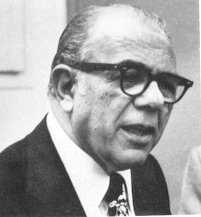
|
| Angelo Bruno |
There are people who deny that Philadelphia has any organized crime; and it certainly doesn't have a Mafia. That may be true, but still the rumors do persist. They say in the street that someone named Angelo was once the head of the mob, and that may not be true either. However, it is true that one day he had his head blown off sitting in his car, and it is definitely true that the sidewalks were swept and completely safe for several blocks around his South Philadelphia house. If there was an empty parking space along that block, no one took it.
One day before he met his untimely end, he was a patient on the seventh floor of the Pennsylvania Hospital, and the patient in the next room was a ninety-six-year-old starchy matron, whose faculties were a little impaired, and who had a daughter named Mary Stuart. As commonly happens with old ladies at sundown, one evening the matriarch became a little confused, and shouted out, "Mary Stuart!" After a brief pause, she repeated, "Mary Stuart, Mary Stuart!" This continued for an hour, and finally, Angelo put on his bathrobe and came around to see what was going on next door.
When he appeared at the door, the old lady sat bolt upright and said, "Young man, just who do you think you are?"
Angelo smiled broadly and replied, "Why, I'm Mary Stuart."
The Hospital That Ate Chicago (1)

|
| George Ross Fisher M.D III |
One evening in 1979 my visiting son, puzzled by health financing, asked me to explain. A decade of asking myself the same question led to the prompt reply that there seemed to be two central problems, both of them man-made. It's axiomatic in our family that man-made problems can have man-made solutions.
I believed you adequately understood health care financing if you understood the price reduction which hospitals give to subscribers of Blue Cross but not to subscribers of their competitors, and if you also understood the income tax dodge which the Federal government gives to salaried, but not to self-employed people who buy health insurance.
He asked how in the world these two subsidies were defended, and I told him. He then asked how these monopoly-inducing subsidies related to other weird quirks of health finance, and I told him that, too. He listened quietly for thirty minutes, and then exclaimed, "Wow. That's really the Hospital that Ate Chicago!"
So he went to bed, while I stayed up and wrote a short fancy for the New England Journal of Medicine, called, "The Hospital That Ate Chicago". Next morning I polished it a little and sent it off to the editor. Within a few days, it was accepted. Six weeks later it was in print.
Swashbuckler
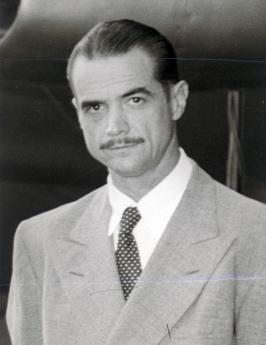
|
| Howard Hughes |
In 1947, Howard Hughes was summoned to Washington to testify at a Senate hearing. Claude Pepper, Democrat of Florida, was in the chair, clearly angry about Hughes' conduct of munitions contracts, including flagrant non-performance. Three wooden flying boats had been commissioned for $18 million but not produced, people had been killed in crashes of test planes, and the newspapers were full of obscure allusions to unspecified wrong-doing in high places. Although the Hughes hearings were front page news for weeks, in those days it was only necessary to walk in and sit down if you wanted to watch them.
Under the circumstances, it would have been understandable if Hughes had been reduced to a trembling mumbler, probably advised to "take" the Fifth Amendment with every question. Congressional chairmen, particularly Claude Pepper,
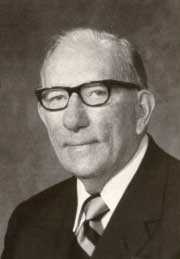
|
| Claude Pepper |
quite regularly grandstand and bully the helpless witness at hearings like this, since it portrays them to the voters as heroic defenders of the public interest, and could even forward their chances of becoming a Presidential candidate. Hughes the scapegoat seemed to be in for a public flogging. The first step was to haul him before the committee and then keep him waiting for an hour or so, while the members attended to important public business, maybe even had to go for a roll-call vote or something. You could tell that things were not going according to the usual script when Hughes himself arrived quite late, accompanied by quite a large staff or retainers. When Pepper still delayed the hearing, Hughes called for a newspaper and elaborately read the comic pages.
The Texas swashbuckler didn't look the part. His accent and tailoring reflected a New England boarding school, and while his mustache resembled that of his friend Errol Flynn, he had a voice like a lion and lightning retorts that would do credit to Bill Buckley. Reminding the Chairman that he had been deafened in the crash of a racing plane, he asked him to repeat the question. Sorry, please repeat it again. And again, and again. Pepper was beside himself.

|
| The Spruce Goose |
Flustered, Pepper tried to reverse the treatment. Senator, I have already answered that question. Well, answer it again. No, I stand on my previous testimony. I forget what you said. Have the stenographer read it to you. Her transcript is not complete. Very well, my own secretary will read it back to you.

|
| Glomar Explorer |
As if to demonstrate that he hadn't defrauded the government, Hughes, who always test-piloted his own planes, flew the H-4 about a mile in less than a minute during what was supposed to be a taxiing test on November 2, two months after his congressional testimony.
In another strange and unexplained footnote, the Glomar Explorer was a ship built in Philadelphia and used in Project Jennifer in an attempt to salvage a sunken Russian nuclear submarine and discover any secret technology it might contain. This was long past the time when Hughes was supposed to be disgraced and banished from Government contracts. The Senate hearings obviously had no effect on his status, and indeed might even have been entirely staged to mislead the Russians and others. Like so many things in his life, this episode has no readily obvious explanation.
Only in retrospect is it possible to see that Hughes was involved in lots of top-secret matters, and the bravado of his defiance -- not to say contempt of Congress -- might have had roots in some sure knowledge Pepper would not dare touch him. The CIA commissioned him to build the Glomar Explorer to find a sunken Russian submarine, using a phony story of manganese recovery. The supposed political victim of the much later Watergate break-in, Larry O'Brien, is said to have once been a Hughes employee; on the other hand, Hughes was very close to the Nixon Administration. There were inevitably many ties between his Las Vegas gambling empire and Cuban underworld figures, as well as Hollywood figures. Hughes was an owner of the Dallas movie theater where John Kennedy's murderer Lee Oswald tried to hide and was captured. It is not possible to judge Howard Hughes by the usual standards; this eccentric billionaire was capable of doing unimaginable things and it will be remarkable if spectacular news about him ends with his death.
Unintended Consequences for Advanced Placement
The Nov. 23, 2004 Wall Street Journal writes that "Elite High Schools Drop AP (Advanced Placement) Courses," thus taking me back to 1943, when I guess I started the idea now being dropped.
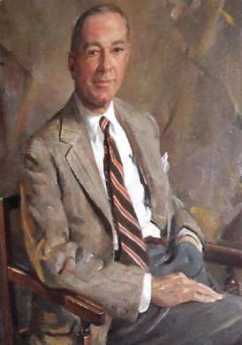
|
| Allan Heely |
The then Head Master of The Lawrenceville School, Allan V. Heely, came around to Yale to visit recent graduates in their college freshman year. For secondary school principals that would, in itself, be quite a novelty today. We certainly considered it a novelty to have him actually buy us a beer, since six months earlier we would have been instantly dismissed from school without hope of appeal, just for one provable beer. The alcohol issue to one side, I can see in retrospect that the Head Master made a serious effort to socialize with his senior students, inviting them to tea every afternoon, and coffee after Sunday chapel. What might sound like quaint Victorian ceremonies to an outsider were in fact conscious efforts to create a role model of the mythical Renaissance Man. He and the school chaplain played piano duets and sang witty songs of their own composition. He brought in famous guests from New York and Philadelphia and made them perform as conversationalists. Jacques Barzun and John Erskine were memorable examples. I can even see in retrospect he was displaying his elegant talented wife as an example of the sort of woman we were urged to marry. To visit his graduates in their early formative years in college was entirely in keeping with his concept of education as the basis for character development. There was even a quote from J. P. Morgan: "Brains don't make success, character does."
Well, for all his effort to be friendly, when the Head Master visits you at college it's a little hard to know what to talk about. So, to be helpful, I pointed out that the science courses were not smoothly integrated between secondary school and college. An example was the contrast between my roommate (Peter Max Schultheiss, now Professor Emeritus of Electrical Engineering at Yale) and me. Pete had scored 100 -- no mistakes on any quiz, all year -- in both Chemistry and Physics, whereas I had not taken either course at Lawrenceville at all. Yet, here were both of us in the same Freshman introductory courses at Yale, required before more advanced courses could be taken. Naturally, Pete had an easier time of it, but at the end of the year we were at the same point, and we both felt he had wasted his time taking the same courses twice. Why couldn't Lawrenceville make an arrangement with Yale to waive the requirement for some introductory courses, saving educational time for something else?
Mr. Heely did a lot better than that. At that time, ninety seniors from Lawrenceville went to Princeton every year, a hundred seniors from Andover went to Yale, and about the same number went from Exeter to Harvard. A pleasant dinner was arranged for the three headmasters and the three University presidents, at the conclusion of which the deal was done. Advanced placement was put into effect. As I understand it, the AP system gradually spread, and last year 14,900 secondary schools offered Advanced Placement courses. You could play around with those numbers and conjecture several million college person-years of education were put to better purposes over the last 62 years. It's a really nice feeling to believe that one twenty minute conversation by two eighteen-year-old boys could have such a useful effect.
So, now what's the problem with these elite high schools, that want to drop AP courses? It's hard to speak on their behalf, but I'm in a unique position to know the original idea has twisted out of shape a little. The original purpose was to eliminate mandatory repetition of introductory college courses, but nowadays competition for admission is so ferocious that repetition is considered a very smart thing, to beat the system. It works up and down the educational system, awarding a high score for coasting through a course the second time. Advance placement thus becomes a bribe not to do that, and the power of the bribe is prestige for admission to some higher level. With 15,000 high schools (like Garrison Keillor's Lake Wobegon) claiming to provide superiority, there has to be accreditation, and for that, there has to be a standardized test. Before long, the curriculum is dominated, not by what the teacher thinks is superior, but by what is likely to be on the accreditation test. In effect, we get a French-like system in which the bureaucracy dictates what is best for the Leaders of Tomorrow. That's quite different from the time when outstanding secondary schools produced an unusually good product, and colleges were asked to recognize it. It's hard to say who's been corrupted here; probably everybody, because it's mass-produced accreditation. If you want to evaluate whether to permit more or fewer waivers for a certain school, you need to evaluate earlier waivees when they reach Junior or Senior level in whatever college had previously done some waiving. Only at that longitudinal point in the process is it possible to conclude whether the waiving of repetitious introductory courses had been useful or harmful.
Underneath all of this is the self-fulfilling prophesy that graduation from a handful of elite colleges will assuredly lead to success in life. If what we need are leaders who are vicious competitors, practiced in circumventing hurdles on the way to getting to the top, credentialism is perhaps a regrettable necessity. But if, as Mr. Morgan said, it's character that matters, gaming the system is not a completely ideal way to promote it.
Getaway
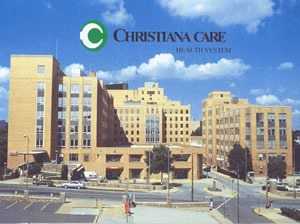
|
| Delaware Hospital in Wilmington |
Occasionally prisoners must be taken to the hospital, and that's a problem for the authorities. Philadelphia General Hospital had a special prison unit on its grounds, so the problem for the guards was merely to transport the prisoner to the locked hospital ward and bring him "home" after his medical problems were fixed. The State of Delaware doesn't have a prison unit in any hospital, so the security risk must be addressed by sending at least two guards, night and day, to some hospital, and securely manacle the prisoner to the bedstead. Nobody likes this situation, particularly the head nurses, but no one has a better solution to offer.
When prisoners have to make an outpatient trip for an x-ray or similar, there is usually an iron rule: no one is to know about it in advance. In one particular case, however, a convicted Delaware murderer had to have an x-ray of his gallbladder, which in those days required swallowing some large pills the night before. That was the tip-off.
On the specified morning, he was bundled into a patrol car with manacles and guards, and whisked off to the Delaware Hospital, now the Delaware Division of the Wilmington Medical Center. The x-ray department was at the end of a long corridor, with the diabetic clinic on the right and the bathrooms on the left side of that corridor. The entrance was on the side of this corridor, right next to the office for visiting consultants. Things were busy but peaceful that morning when a commotion arose. Three prison guards came marching through the door, surrounding their manacled prisoner. They turned left, and down the long hall to the x-ray department.
As they passed the men's room, the prisoner begged his guards to let him relieve himself, so they took him into the bathroom, removing the handcuffs. He washed his hands, dried them with a paper towel, pushed it into the waste container. Then quick as a flash he thrust his hand deeper into the crumpled waste paper, got the loaded revolver his accomplices had put there, and emerged from the wastebasket -- shooting. The guards got down on the floor, a bullet went into the Diabetic Clinic were a very prominent society lady was working in a pink volunteer's uniform, and another bullet went into the consultants' office, which on other days I might have been using. The escapee was running hard, fired one final bullet into the ceiling at the door, and was out in a second to the waiting getaway car where his buddies were ready. He got away clean, as they say.
There's nothing like an episode of that sort to bring people together. We were survivors of an exhilarating experience, having something in common that no one could take away. For a couple of years afterward, the bullet hole remained unobtrusively in the ceiling by the entrance. The nurses told me that workmen had arrived several times to patch it up, and the society lady, who was a trustee of the hospital, wouldn't let them fix it. That was our bullet hole.
Goat Head Merchant
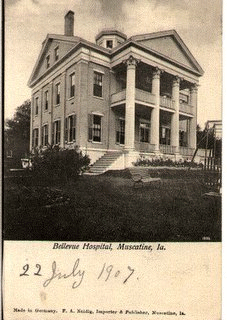
|
| Bellvue Hospital |
In 1948, one of the Internet physicians at Bellevue Hospital contracted tuberculosis. The senior medical students at Columbia were asked to volunteer to take his place, and for a month I did so. Since I knew I was soon going to Philadelphia to the Internet at the Pennsylvania Hospital, my interest was particularly taken by an old Bowery bum who was talking about untaxed liquor. In New York at that time, it was common for Skid Row denizens to drink the wood alcohol in Sterno, called "squeeze" because it could be extracted from the waxy contents of a Sterno can by wrapping it in cheesecloth or a handkerchief and squeezing out the juice. Another favorite was "Smoke", which was typically a mixture of automobile radiator fluid and other sundry handy ingredients. My new best friend at Bellevue was just recovering from the effects of such recreation, and was in a mood of "never again". He observed that "When I get out of the Bell View, I'm going to get on a bus and go down to Philly. They've got a drink there called Goat Head, and, man, is it ever smooth."
The Chief Resident of the Pennsylvania Hospital was happy to tell me what Goat Head was. It was bootleg liquor, made in the Pine Barrens of New Jersey. Bags of cane sugar were fermented and distilled through coils of copper tubing, obtained from old hot-water heaters. The smooth stuff that so intrigued the bums of Bellevue was what was otherwise known as "White Lightning". It was then sold in the alleys near South Street by "Goat Head Merchants", who carried a suitcase full of small bottles, sold for about 25 cents a bottle. They say that during the Depression, Goat Head was sold out of an open bucket, at 10 cents a dipperful. One of the Goat Head Merchants used the Accident Room of the hospital as his family doctor, let us call him Walter Apple.
One day, Walter had a heart attack and was brought in on a stretcher, in considerable pain. I had just completed an electrocardiogram on him, when the pain disappeared. A few weeks later, he had completely recovered and was going home. Every time I came anywhere near him, he announced to everyone in the vicinity that I was the best doctor in the world, having cured his heart attack by giving him the "wire treatment".
As he gathered up his belongings to go home, he apologized that he was not going to be able to pay his bill. He had once known Dillinger and all those other big shots wore a diamond stick-pin and drove a Duesenberg car. But now he was broke.
But grateful, too. So, if ever there came a time when I encountered someone unpleasant, who needed "pushing' around" -- just you call on Walter Apple, and Walter would be glad to pay off his debt.
Growing Legs
Health Savings Accounts
The legislation removes the hampering restrictions of the 1995 Law. What follows is a brief outline of the main features of the HSA/MSA clause in the 2003 law,
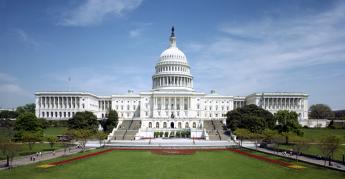
|
| U.S. Capital |
as published by the main authorizing committee, the House of Representatives, Committee on Ways and Means. From this point forward, more specifics of the program will probably be written by the Executive Branch and published in the Federal Register. The Ways and Means Committee will continue to exercise oversight authority, however, in conjunction with the Senate Finance Committee. As a consequence, statutory modifications of the program are likely to appear in future annual budget reconciliation acts, or else in any new Medicare amendments. The legislative route map becomes more understandable when it is recalled that Medicare itself is considered to be an amendment (Title XVIII) of the Social Security Act.
Committee on Ways and Means
Medicare Prescription Drugs, Improvement And Modernization Act of 2003
Health Savings Accounts (HSA's)
Lifetime savings for Health Care
Working under the age of 65 can accumulate tax-free savings for lifetime health can needs if they have qualified health plans.
A qualified health plan has a minimum deductible of $1,000 with $5,000 cap on out-of-pocket expenses for self-only policies. These amounts are doubled for family policies.
Preventive care services are not subject to the deductible.
Individuals can make pre-tax contributions of up to 100% of the health plan deductibles. The maximum annual contributions are $2,600 for individuals with self-only policies and $5,150 for families (indexed annually for inflation).
Pre-tax contributions can be made by individuals, their employers, and family members.
Individuals age 55-65 can make additional pre-tax "catch up" contributions of up to $1,000 annually (phased in).
Tax-free distributions are allowed for health care needs covered by the insurance policy. Tax-free distributions can also be made for the continuation coverage required by Federal law (i.e., COBRA), health insurance for the unemployed, and long-term care insurance.
The individual owns the account. The savings follow the individual from job to job and into retirement.
HSA savings can be drawn down to pay for retiree health care once an individuals reach Medicare eligibility age.
Catch-up contributions during peak savings years allow individuals to build a nest egg to pay for retiree health needs. Catch-up contributions allow a married couple to save an additional $2,000 annually (once fully phased in if both spouses are at least 55.
Tax-free distributions can be used to pay for retiree health insurance (with no minimum deductible requirements), Medicare expenses, prescriptions drugs, and long-term care services, among other retiree health care expenses.
Upon death, HSA ownership may be transferred to the spouse on a tax-free basis.
Contain rising medical costs- HSA's will encourage individuals to buy health plans that better suit their needs so that insurance kicks in only when it is truly needed. Moreover, individuals will make cost-conscious decisions if they are spending their own money rather than someone else's.
Tax-free asset accumulation- Contributions are pre-tax, earnings are tax-free, and distributions are tax-free if used to pay for qualified, medical expenses.
Portability- Assets belong to the individual; they can be carried from job to job and into retirement.
Benefits for Medicare beneficiaries- HSA's can be used during retirement to pay for retiree health care, Medicare expenses, and prescription drugs. HSA's will provide the most benefits to seniors who are unlikely to have employer-provided health care during retirement. During their peak saving years, individuals can make pre-tax catch-up contributions.
Chairman Bill Thomas Committee on Ways and Means 11/19/2003 12:56 PM
Illicit Drugs are Eliminated in Philadelphia
It seems fair to say that America is nearly desperate to find a successful way to eliminate the illegal narcotic trade. We've had a war on drugs, which seems to have three components, all failures. We have an occupying army in Afghanistan where most heroin comes from. We've sprayed weed killers on Bolivia, Colombia, Mexico, and found various other ways to assist local narcotic agents in their efforts to break up the planting of cocaine in Latin America. We've got high-speed patrol boats and helicopter patrols around southern Florida. Spies of all sorts have been hired to infiltrate the distribution channels. We've spent other tons of money educating school children that experiments with chemical recreation are risky, immoral, dumb, whatever. Sly, naughty allusions to drugs with cute code names have been pretty well driven off the television, night club acts, and even glitzy cocktail parties in the advertising business. Ronald Reagan had a simple solution --"Lock 'em up" which led to the passage of national law, leap-frogging the trials of drug offenses ahead of all other criminal offenses. The consequence was that prisons filled up and overcrowded conditions became a scandal. It may cost more to send someone to jail than to send them to Harvard, but the situation seemed to require us to ignore the cost, get them off the street, bring this problem to an end. If any of this work, or if all of it collectively worked, it didn't work very well. This is a very big problem that seems to defy solution.
So, one of the desperate ideas put forward has been to decriminalize drugs. That is, stop making their sale and use illegal. Abundant drugs would become cheap, cheap prices would eliminate the drug dealers' profit, and lack of supply of pushers would cause the supply to dry up. That is, no one would bring the heroin from Afghanistan, or the cocaine from Bolivia -- because there was so much of it around that the profit disappeared. Wait a minute. Did you just say that no one would import expensive narcotic because we would already have so much cheap narcotic? Somehow, it isn't persuasive that decriminalizing drugs would eliminate addiction. So, what other methods can claim proven success?
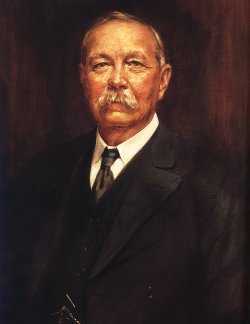
|
| Conan Doyle |
Let's try Philadelphia's system, by which I mean Philadelphia from 1940 to 1960. I graduated from medical school in 1948, filled with instruction about how to recognize the signs of drug addiction, how to detoxify, what precautions you ought to take to keep the student nurses from stealing the ward morphine supply, how carefully you had to monitor the pharmacy and anesthesia departments. Our older instructors were full of anecdotes about how clever the addicts were in fooling the doctor, how they themselves had been tricked or almost tricked, medical friends they knew who got hooked. Bad business, and it's important that every new innocent doctor is warned about how prevalent and how deceptive it was. Just read detective novels by Conan Doyle, who was a physician, addict, or De Quincey confessing to being an opium eater, or Coleridge writing Kubla Khan while in a drug stupor.

|
| Angelo Bruno |
So, my teaching and mentoring prepared me to believe that narcotic addiction was rampant before 1940. But when I came to Philadelphia I absolutely never encountered any of it, or at least until about 1970 when the Beatles and the Flower Children of California made it a deliciously tempting adventure. And I spent most mornings during that period doing teaching and charity work at Philadelphia General Hospital for thousands of indigents. If drug addiction had been anywhere in the city, it seems to me it would have been at PGH. We had thousands of cases of alcoholism, of tuberculosis, of syphilis in all its forms, suicides, homicides, bullet wounds, a prison ward full of manacled prisoners. But no drugs, nossir. It was a nice situation, and after a little while, you stop wondering about dogs that don't bark, and drug addicts that don't come in the accident room door. But a couple of decades later, when we had lines of heroin addicts waiting for their treatment, it all came back to us that we had experienced a remarkable absence of what was now quite common again. It had apparently been prevalent, it disappeared for twenty years, and then it came back. It now seems quite evident that we were enjoying a two-decade drug holiday, but what isn't so clear is what caused it. Whatever could have caused this remarkable temporary disappearance of illicit drugs?
Well, I don't know; and when you say that, you invite everybody to make some wild conjecture. So let me make my own well-ruminated guess, first. It seems worth investigating whether Angelo Bruno, the head of the mob, did it. It is a widely-held belief that Bruno hated the narcotics trade, and issued orders that there was to be none of it in his territory. It's quite possible that this was a purely business decision since there was plenty of money to be made from bootlegging and loan-sharking, whereas the narcotics business got you a lot of unwelcome heat from the police that would interfere with your profitability. By that reasoning, perhaps the war on drugs did have a beneficial effect, but it operated indirectly on the mob boss. Who was in a position to know what was going on in his territory, who was responsible, and what methods might be effective in discouraging the trade. But that explanation assumes the worst possible motives on Bruno's part.
Let's at least consider the possibility that Bruno had a large streak of decency in him, and really didn't like the narcotics racket even if it cost his organization money to get rid of it. And got his head blown off when greedier folk decided to eliminate this obstacle to their prosperity.
So, by that analysis, you have the Philadelphia System for a drug-free city. A system of proven effectiveness, when every other proposal has failed. Just pass the word that nobody will bother you in your loan-sharking and bootlegging, just so the distribution of illegal drugs stops completely. How you accomplish this is up to you.
Franklin's Admirers on TV
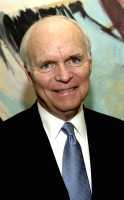
|
| Brian Lamb |
There are now three channels of C-span, continuous cable television programs about the influence of history on current problems. Sessions of Congress and its committees, the speeches of the President, political campaigns, are shown as they happen. But interviews and book reviews are shown in parallel, with an opportunity to go into the archives and organize originally unrelated programs into seminars on a current topic. The editor, Brian Lamb, has a light hand and considerable impartiality. But he's there, all right, organizing blogs into topics just as Philadelphia Reflections tries to do.

|
| Friends Select School |
This similarity of design had been floating around for some time, but it suddenly came into focus when I recognized myself in the front row of an audience on C-span, listening to Edmond S. Morgan talking at the Friends Select School about his new book on Benjamin Franklin, a few months earlier. Thank goodness I bought a book and had it autographed because the filming had been so unobtrusive I hadn't noticed it at the time. I clearly need to have haircuts more frequently. Professor Morgan's parting words that evening had stayed with me, "Franklin doesn't tell you everything about himself, but what he tells you -- is straight." That's quite a compliment from the editor of 47 volumes of Franklin's work.
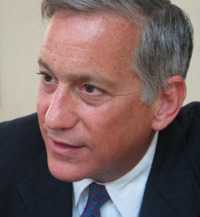
|
| Walter Isaacson |
Grouped with this tv portrayal of me as a groupie were interviews with Walter Isaacson and some other Franklin biographers, taken at other times and placing focus on other aspects. Here again, more insights emerged from quickly considered replies to audience questions than from the prepared speeches. Replies to questions from the audience are more in a class with blogs, anyway. Whenever you get all of the adjectives and qualifications polished, you sometimes don't say what you mean. Perhaps that last comment can be rearranged to say that answering audience questions occasionally leads to blurting out precisely what you mean.
And so, two unrelated audience answers need to be linked. A question about Franklin's love life caused Isaacson to refer to Franklin as a lifelong seducer. From the unknown mother of his illegitimate son William, to the simultaneous flirtations with two famous French ladies that took place when he was an octogenarian, and not overlooking several other affairs with Cathy Green and Polly Stevenson and allusions to others, Franklin was obviously an accomplished seducer in the full meaning of the term. It is thus legitimate to suspect the techniques of seduction at work in many of his public projects, from starting the Library Company to persuading the French to help the Revolution. He discovered late in life what many have discovered about the life of a diplomat, and quickly recognized that he was already pretty good at what that seemed to entail. Let's slide to a slightly different application of that idea.
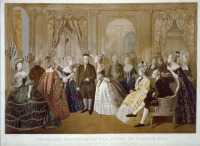
|
| Benjamin Franklin and French Women |
By the accident of hostess seating arrangement, I found myself seated next to two historians from Harvard, and somehow it came out that one of them felt that Franklin loved the French. Simply loved them. Somehow that didn't sound quite right when compared with Franklin's early years of mobilizing Pennsylvania to fight the French, starting the first National Guard militia unit to defend Philadelphia against French raiders, supporting General Braddock's expedition with his own money, urging the British government to sweep the French from Canada, and working most of his life to assemble the colonies and Great Britain into one world-dominating entity. It's true that 18th Century France was at the peak of scientific achievement, and Franklin the inventor of electricity was quickly taken in by the European scientific community, but that's scarcely the same thing as loving France. Louis XVI was in fact quite annoyed by all the attention Franklin was receiving. And so the scholar on TV went on to say that correspondence had been discovered in which Franklin quite casually remarked that during the Continental Congress he had strongly argued that America should stand alone and have no European allies. Congress it seems overruled him, so he dutifully set sail for France to seduce them.
We come to another chance social encounter. On a recent trip to Paris, the GIC had taken along as a speaker, no less than a member of the Open Market Committee of the Federal Reserve, a Governor of a Federal Reserve District, to speak about the threat of inflation and currency crisis. In time, our French hosts invited us to look at some documents of interest, like the Louisiana Purchase. Lying on the table was the original treaty between America and France, signed by B. Franklin. The Federal Reserve governor, making small talk, observed that Franklin sweet-talked the French into loaning America too much money, eventually leading to their bankruptcy. As I recall, my rejoinder was, "Well, just print some more paper money, right?" It was intended to be a jocular remark, but it somehow didn't seem to be taken as such.
Hold the Presses
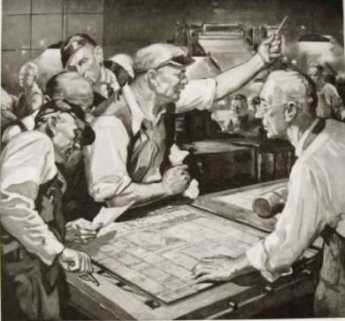
|
| Stop the Presses |
At USAToday, techniques are astounding. After getting an 800-word piece, an editor by phone will suggest cuts to 300 words; the piece is always improved. Last-minute speed, trying to watch television, is unbelievable. On one occasion, after a medical meeting in Kansas City, watching a baseball game go into extra innings I fell asleep with the game undecided. The next morning a newspaper was pushed under my door. It was USAToday, not only carrying the final score but a full story, under a color photo of the winning play. Just consider the precision Chicago reporting, Washington DC editing, Kansas City printing and local delivery that took place in seven hours. By contrast in book publishing, a full year often intervenes between manuscript submission and actual bookstore sales.
So on a certain Monday night, the editor called. The Senate Majority Leader, George Mitchell, finally was to unveil the Clinton Health Proposal tomorrow morning. Would I please submit an editorial to run in the morning paper; he would supply the title. It was to be called, What Should Congress Do Now? and the deadline was 7 PM tonight. My watch read 5:30 PM.
Well, what fun. After a few minutes of stumbling around, I resolved to build the editorial around the theme, Don't Make Things Worse. It then seemed natural to allude to similar proposals gone famously wrong, define some predictable traps, and end up with Hippocrates. Over and over it is thundered at medical students: Primum non nocere. First do no harm. It all came together in my head, and I sat at the typewriter to bang it out. But when I came to that last sentence, pleading at least do no harm, I was hit by terrible doubt.
That phrase comes to us in Latin, and Hippocrates was a Greek, living at least five hundred years before the Roman Empire. Famous though the saying is, it wasn't (then) in Bartlett's Quotations, or Roget's Thesaurus, or anything else I could lay my hands on in what was, after all, a medical office. It was 6:50 PM. I called a learned friend from his dinner-table, and he agreed it was a strange business, looked at a couple of books, couldn't help, sorry. So, I drew a deep breath, said the Hell with it, typed in, "As Hippocrates said, At Least Do No Harm," and shoved it into the fax machine. The next morning it appeared, next to two million copies of my photo; so at least the editor seemed to like it. Some friends soon called to say that Senators Dole and Moynihan had adopted the line on the noon and six o'clock news, each attributing it to Hippocrates. No matter what happened to the Clinton Health Plan, it looked to me as though I would be forever guilty of supplying the world with a highly quotable misquotation.
Since then, with more time to do a proper search, I'm unfortunately still uncertain. William Safire at the New York Times, was intrigued but could only refer me to a nice lady at the Library of Congress who was a crony. She tried to help but was stumped. Some Hippocrates scholars at the Library of the Philadelphia College of Physicians were able to find a reference in The Epidemics which seems to say what we are looking for, and that reference has tardily crept into Bartlett's latest edition. Some people think Galen really wrote it, which might account for the Latin; but even that is unsatisfying to scholars. Somebody or other took that phrase, whether written by Hippocrates or not and pounded it over and over until it became a medical student incantation. Even if Hippocrates actually did express that sentiment in passing, it doesn't come through as a really important statement, and there isn't much evidence that his students were repeating it over and over as the words of the master.
My present suspicion is that vague rumors about Samuel Hahnemann, the father of Homeopathy having a hand in promoting the slogan during the Nineteenth century, may have some underlying substance. Homeopathy was a belief system which emphasized the prescribing of infinitely minute doses of medicines. It had a flurry in the 19th Century when conventional Medicine was reeling from excesses of bleeding and purging, which surely did a lot of harm to victims of, say, Yellow Fever. The acrimony even spilled over into the emotionalism of the abortion debate, because laws prohibiting abortion had been sponsored by the allopathic American Medical Association. The verbal warfare between doctors of Homeopathy and "Allopathy" was bitter beyond describing. Although conventional medical care finally got its feet on the ground, and homeopathy is now pretty much a historical relic, the homeopaths did have that big strong point. Doing nothing is clearly better than doing something harmful. Nobody takes Latin, much, anymore. So the modern medical way of saying the same thing has come to be, "The hardest thing to do, is to do nothing". This way of stating the same idea is widely believed to have been offered by William Osler, but after all the controversy about Primam non-nocere , I am now reluctant to be too sure about anything in this area.
Funny Toes: A Physician Viewpoint

|
| Webbed Toes |
It probably took me twenty years to notice that, unlike most people, I had an incomplete separation of my second and third toes. I thought my toes were like everybody else's, but once you start peeking, you see that webbed toes are not normal, although they are not really rare, either. After another thirty years, it became apparent that most of my numerous descendants had the same kind of toe; it was obviously an inherited condition. When the family clan gathered at the beach, it was a source of mild amusement, possibly even a little pride. A few weeks ago, I happened to mention the matter at a party, whereupon another doctor promptly pulled off his shoes and socks, and revealed fused or webbed toes of a much more striking sort than mine; obviously, he was proud of it, too. He is of an old, old Philadelphia family that owns one of the oldest, if not the oldest, a house in Germantown. His family, too, is stigmatized in the same way only more so. In Philadelphia, when you are proud of your family, you are really, really, proud of it.
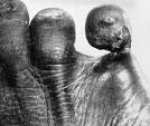
|
| Ainhum |
Which brings me back to my days as an intern in the accident room of the Pennsylvania Hospital. When there is a sudden crowd of emergencies in an emergency department, the nurses get all of them undressed, put in a hospital gown, and instructed to wait for the doctor behind a curtain that doesn't quite reach the floor. For some reason, as a medical student, I had been particularly struck by a photograph in a textbook of an inherited disorder said to have been first noted on a slave ship; the disease in the native language was named Ainhum. For reasons obscure, a tight little band appears at the base of the fifth, or little, too. It gets slowly tighter over a period of months, and eventually, the little toe falls off. That's all there is to Aihnum, and all that was known about it. So, imagine my surprise and delight to walk past a row of naked feet sticking out below curtains -- and there was my first and last case of Aihnum.
I summoned my colleagues, and the visiting medical students from both Jefferson and Penn who at that time shared training in our accident room. I raced off to my room to get a camera to record this momentous event. An elderly staff physician, either Tom McMillan or Charles Hatfield, wandered past and was invited to share the excitement. Well, he says, I saw one of those forty years ago, it looked just like that; old Doctor Norris showed it to me when I was an intern. Much murmuring ensued but abruptly stopped when the patient himself rose up and started putting on his clothes. He was going home, but why? "Well," he growled, "I came here because my back hurts, and all you people do is look at my toes!" He said he was going over to the Jefferson Hospital to get proper treatment, and I guess he did.
And finally, there is Morton's Toe. Or perhaps more properly, Mortons' Toes. There were in fact two Doctor Mortons, one of them at Columbia College of Physicians and Surgeons where I went to school, and the other at the Pennsylvania Hospital where I interned. In New York, Morton's Toe refers to a painful callous, or neuroma, that forms on the bottom of the victim's big toe. In Philadelphia, such an answer would get a failing grade, because the Philadelphia Morton had noticed that some people have a big toe that is shorter than the other toes, instead of being bigger as the term would suggest was proper. The tricky thing about this relatively harmless variant is that the big toe is actually not short at all. The foot bone, or metatarsal, is short, so the toe of normal length sits back farther on the foot and just looks shorter. The main significance is for shoe salesmen since the shoe needs to be long enough to avoid crushing the other toes.
So now, you readers who were not lucky enough to go to medical school can get a feeling for what it seems like to be a doctor. The other significant shared bond within the fraternity is a sense of outrage at the way health insurance companies drag their feet paying doctors, but that's not limited to feet..
Christmas Reflections
My father in law, a prominent obstetrician in Binghamton, New York, regularly took his family to New York City sometime between Thanksgiving and Christmas. The three-day junket was described as a visit to do Christmas shopping. Another relative made similar trips from home in Tyler, Texas. Several of my patients made such visits to Philadelphia from their homes in West Virginia, stopping by to make a medical visit to me during the same trip. From the seasonal crowds in Penn Station and in the shops on Chestnut Street, it was clear that an annual visit to the big city was a common custom in the upper crust of small to medium-sized cities, for whom the more expensive shops of the bigger city provided big-ticket items bought infrequently, and the distinctive luxuries which made them stand out from the socially less-enlightened back home.
These shopping visits were not confined to purchasing, although that was the main focus. It was a time to go to the theater, orchestra and opera, maybe an occasional ballet and art exhibit. The choice of a large city might be related to returning to the University, or another period of professional training for a drop-in visit because these associations made it possible to observe the latest trends and innovations, a useful issue in the smaller towns. The ladies could observe the trends in fashions, and everyone would have a chance to dress up in the better hotels and restaurants. This recirculation between the small towns and the big one at the hub unified the region, establishing hierarchy rather widely. And it hardened traditions in the big city, since islanders tend to return to the same hotel, restaurants and social gathering spots even more than the local residents do; there isn't time in a brief visit to shop for new venues, unless the trip itself reveals that times and places have somehow changed in an important way.
 |
| Wannamakers Pipe Organ |
That's all changed, today. The pipe organ at Wannamakers, the cluster of department stores around Eighth and Market, the theater district, Caldwell's and Bailey Banks and Biddle upscale jewelers, the fancy women's clothing shops on Walnut and Chestnut Streets, and the bespoke men's tailor shops -- have disappeared in a slew of retail despond. The excited crowds of upscale shoppers have dwindled, at least in the center city shopping area. Students of sociology point to the decline of the department store as a central commotion in the center of this phenomenon, blaming that in turn on the spread of national brand names by television and more electronic forms of advertising. The department store did your comparison shopping for you, putting its brand name on the product and placing its reputation behind the choice. If Wannamaker could determine that a Japanese radio was of high quality, it became Wanamaker's radio. Today, Samsung and Sony do their own advertising, sell their products through outlets in the suburban malls. Philadelphia residents enjoy as much retail choice and pricing as ever, they just shop in the malls located along the Interstate circumferential highway, just outside what used to be the outermost suburbs. So the volume of retail shopping among Philadelphians probably hasn't changed a great deal; it has merely shifted to the malls where there is parking for your car to transport goods which the department stores used to deliver. It is the annual visits from the subordinate small cities at moderate distance that has disappeared. Small cities now have their own shopping malls, carrying national brand name merchandise. Losing this source of business, the associated entertainment industry has declined to a point below sustainability for most of them -- in the center city hub. Along with the disappearance of this regional recirculation, small cities have lost their sense of affiliation with a bigger one. The small-town professional class which was the biggest participant in this annual migration is professionally more isolated but so are their clients. The upper crust of the small town now must constrain its horizon to the smaller town professionals, with their lesser claim to distinction. For a while, the disparity can be overcome by specialization, but ultimately the distinction of the big-city specialist rests on assembling a richer experience from wider drawing power. In Medicine at least, the insistence of Medicare on paying the same fee for the same service lessens the economic incentive for self-repair of the system.
 |
| Wannamaker's Christmas Light Show |
Meanwhile, nature of Christmas itself is becoming standardized. Fewer people make their own Christmas presents, whether through knitting or baking. If the process of commercial gifts goes the full distance, eventually the joy of searching for exactly the right gift will seem more like paying your taxes. These things already cost too much, are worth too little, and neither the process of giving a gift nor the process of receiving a welcome gift will retain much joy. Or significance. What was until recently a Christian religious celebration has become diversified into a generic "Happy Holiday", presumably in order to avoid offense to other religious groups who themselves likely persist in their old traditions of ritual greeting. The assault on Christmas is however not primarily cultural, but commercial. The silent ostentation of elaborate outdoor lighting and the secular versions of Christmas carols endlessly replayed over loudspeakers in stores, probably have a more destructive effect on the community winter solstice ceremony than any competition for religious adherence.
The coming next step in the modification of the Christmas season is dimly visible in the assault of pocket telephones on the suburban shopping mall. After enjoying only a few years of victory over the center city department store, malls must now confront shoppers with portable telephones containing a camera and GPS geographical locator. Seeing something he likes, the shopper of the future can photograph its bar code in the shop display, and be immediately told of all the neighboring stores which sell the same product for a lower price. Electronics are thus about to turn Christmas shopping into an electronic auction, no doubt making it eventually easier to do the shopping from home.
What Christmastime means to me is a recollection of what it once was like at the nation's oldest hospital, and not so terribly long ago, at that. Before 1965, the Pennsylvania hospital had been staffed for centuries with unpaid student nurses, working under the direction of unpaid doctors in training, supervised by volunteer attending physicians. Of the five hundred beds, only forty were filled with paying patients and the rest were housed in long communal halls. On Christmas morning at 7 AM, the drowsy patients were astonished to be awakened by a procession of very pretty student nurses, led by Miss McClellan the grim-looking Directress of nursing, and followed by a handful of internet and residents, all singing Christmas carols and carrying lighted candles in the dark. Miss McClellan herself was never heard to utter a note, but the student nurses had been trained in four-part harmony, and the interne doctors were enthusiastic followers. The faces of the poor old indigents in the beds were filled with pure delight as we traipsed past, chanting of the travels of Orient kings, the pregnancy of virgins, and other miracles of the occasion.
Christmas Reflections (Podcast)
Minimum Wage Fangdoodle
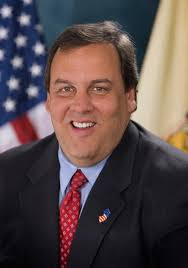
|
| Governor Chris Christie |
The November 2013 elections have been widely accepted to be a spectacular win for New Jersey Governor Chris Christie, suddenly making him a presidential front-runner for 2016. The only other significant election was a close win in the Virginia gubernatorial race for a fund-raising crony of Bill Clinton over the Attorney General who started the Supreme Court Case over Obamacare. In the view of the news media, there were only two elections in this off-year -- a landslide in New Jersey, and a dead heat in Virginia, for Governor.
Well, as a matter of fact, there was also an election in New Jersey for all of the members of the legislature, which means that I was running against the Democratic majority leader in the 6th Legislative District. I got 19,000 votes, but I needed more to win. At least in my family, it was a big event, particularly since no one else in New Jersey contributed a dime to my campaign, and while Governor Christie may have whispered a few encouraging words to me, there was no evidence of his assistance. But you can forget about that, too, because this election was really about the minimum wage.
The first inkling I got that something was up was receiving a sample ballot, three days before the election, where there was a referendum question about the minimum wage that no one had told me about, although it could scarcely have been a secret to get it on the ballot. And secondly, on election day there was scarcely any evidence of campaigning for Democrat candidates except for a few yard signs, but literally, dozens of campaign workers poured into the subway stations, handing out great volumes of campaign literature about the minimum wage. Even that went past me unnoticed, because who in the world would vote for a proposal which would increase unemployment during a severe recession? When I expressed the same sentiment to my Democratic friends, I was surprised to discover they all knew about it in advance. In retrospect, that was a fairly good indication that the Internet had selectively urged support of this proposition to the party faithful, but had not said one word in campaigning for it. It won endorsement by a heavy margin, as things soon turned out. What's worse, what had been endorsed by referendum had been to amend the constitution to this effect, automatically indexing it to the cost of living. It's going to be pretty hard to reverse that since all constitutions have been written to make it very hard to amend them.
p> In the week after the election, I notice that several other states have been considering raising the minimum wage. An article appeared on the editorial page of the New York Times arguing that research showed there was no evidence that raising the minimum wage caused unemployment, and a few days later, Paul Krugman had a learned column on the Times editorial page to the effect that smart people all knew there was no reason to expect unemployment from raising the minimum wage, and only the hopelessly ignorant rubes would imagine there was reason to think so. Having spent some time with editorial writers, it seemed pretty evident to me that there was a nationally coordinated effort to convert this into a truism, accepted so widely it would be futile to argue against it. When it is also possible to see the existence of a campaign to impose a maximum wage (and not merely in Switzerland, where it was defeated on a ballot), the trajectory of a rising minimum wage meeting a falling maximum wage easily led to conjectures that what was really afoot was a campaign to take wages out of the marketplace. Or was that really the goal?
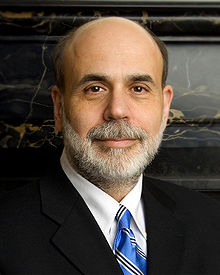
|
| Ben Bernanke |
For months, the Federal Reserve Chairman has been emphasizing that the Fed must obey two mandates: to maintain price stability and to minimize unemployment. Meanwhile, the dirty little secret among economists has been that unemployment is the main obstacle to inflation in the face of a massive enlargement of the money supply. Unemployment is currently at 7.1% and falling, while the Fed has lifted the veil of "transparency" to reveal it made a promise in double-speak to start selling some of the bonds it issued to combat the recession when unemployment reaches 6.5%. As time has gone on, Mr. Bernanke has seemed to back away from that promise. He is not so sure that unemployment is a good measure of unemployment, other measures may be a better measure of what we are driving at. He never meant to start selling bonds when unemployment reached 6.5%, he only meant that he might reduce the number he planned to buy. He never meant to make a promise, he only was being transparent about the current thinking of the Board. And anyway, Janet Yellen will take over his job in a month, so you can't very well bind your successor to do anything at all. What's this tap-dancing all about?
Well, it simply won't do, to suggest that the Federal Reserve isn't as independent of politics as it pretends to be. But everyone noticed that the stock market had a bad fainting spell when he suggested a few months ago that the Board had been discussing the matter; just imagine what it would do if he actually made a promise to act, let alone actually taking an action. By itself, such an announcement would probably send interest rates on a rise toward normal levels. The stock market mostly anticipates the future, so it would jump ahead of whatever action was taken. Since the United States is now the largest debtor on earth, a rise of interest rates would immediately add huge amounts to the current deficit and the projected national debt. The stock market would almost surely drop, possibly severely, in response to such commotion in the debt markets. And the national economy would certainly feel the deflationary effect of such activity in the financial markets, sending markets even lower. Fear of such a reaction would surely persist longer than the real need for monetary easing, making the resultant inflation even worse than it had to be.
 Is it possible the Obama Administration prefers a little extra unemployment, to risking a stock market crash before a coming election? 
|
| Minimum Wage Uproar |
In an era of desperate experimentation with the simultaneous solutions of several problems at once, perhaps the best conservative response to this paper is to seek ways to relax its inflexibility. The political process, particularly the amendment of state constitutions, is a lengthy and cumbersome impediment to agile management of the economy. It is fairly unlikely that a secret springing of a referendum trap can be repeated. The greater risk is that we will know what should be done, but become unable to do it quickly.
Meanwhile, the politicians are designing things and politicians like things simple. The Republican solution is to pass a minimum wage, but keep its benefit slightly below the entry-level wage; they get credit for passing it, but it has almost no applicability. The Democrat approach is to make a big noise about passing a meaningless bill, promising they will make it up with off the balance sheet entitlements, like health care and college tuition. Either way, usually nothing much happens after the election is over.
"Sir"
In 1938 when I was 14 years old, I entered a new virtual country with its own virtual language. That is, I went to an all-male boarding school during the deepest part of the worst depression the country ever had.
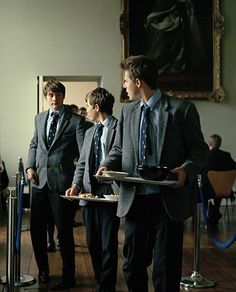
|
| Boarding School |
identified While it should be noted I had a scholarship, there is little doubt I was anxious to learn and emulate the customs of the world I had entered. My life-long characteristic of rebellion was born here, but at first, it evoked a futile attempt to imitate. Not to challenge, but to adopt what I could afford to adopt. The afford part was a real one because the advance instructions for new boys announced a jacket and tie were required at all meals and classes, and a dark blue suit with a white shirt for Sunday chapel. That's exactly what I arrived with, and let me tell you my green suit and brown tie were pretty well worn out by the first Christmas when I came home on the train for ten days vacation, the first opportunity to demand new clothes. First-year students were identified by requiring a black cap outdoors, and never, ever, walking on the grass. The penalty for not obeying the "rhine" rules was to carry a brick around, and if discovered without a brick, to carry two bricks. But that's not what I am centered on, right now. The thing which really bothered me was unwritten, equally peer-pressured by my fellow students, the custom of addressing all my teachers as Sir. The other rules only applied until the first Christmas vacation, but the unwritten Sir rule proved to be life-long.
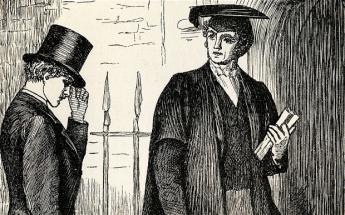
|
| Sir |
And it was complicated. It was Sir, as an introduction to a question, not SIR!, as a sign of disagreement. You were to use this as an introduction to a request for teaching, not as any sort of rebuke or resistance. Present-day students will be interested to know that every one of my teachers was a man; my recollection is, except for the Headmaster's secretary, the Nurse was the only other female employee. The average class size was seven. Seven boys and a master. Each session of classes was preceded by an hour of homework, the assignment for which was posted outside a classroom containing a large oval maple table. Needless to say, the masters all wore a jacket and tie, most of the finest style and workmanship. They always knew your name, and always called on every student for answers, every day. Masters relaxed a little bit during the two daily hours of required exercise, when they took off their ties and became the coaches, but were just as formal the following day in class. I had been at the head of the class of what Time Magazine called the finest public high school in America, but I nearly flunked out of the first semester in this boarding school. It was much tougher at this private school than I felt any school had a right to be, but they really meant it. Over and over, the Headmaster in the pulpit intoned, "Of those to whom much is given, much is expected."
I had some new-boy fumbles. Arriving a day early, I found myself with only a giant and a dwarf for a company at the dining table. I assumed the giant was a teacher, but he was a star on the varsity football team. And I assumed the dwarf was a student, but he was assistant housemaster. One was to become a buddy, the other a disciplinarian, but I had them reversed, calling the student "Sir", but the master by his first name. Bad mistake, which I have been reminded of, at numerous reunions since then.

|
| Yale |
When I later got to Yale, I began to see the rules behind the "Sir," rule. In the first place, all of the boarding school graduates used it, and none of the public school graduates, although many of the public school alumni began, falteringly, to imitate it. Without realizing it, a three-year habit had turned out to be a way of announcing a boarding school education. The effect on the professors was interesting; they rather liked it, so it was reinforced. It had another significance, that the graduates who said "Sir" acquired upper-class practices, the red-brick fellows seldom did. The only time I can remember it's being scorned was eight years later, by a Viennese medical professor with a thick accent, and he was obviously puzzled by the significance. Hereditary aristocracy, perhaps. Indeed, I remember clearly the first time I was addressed as Sir. I was an unpaid hospital intern, but the medical students of one of the hospital's two medical schools flattered me with the term. In retrospect, I can see it was a way of announcing that graduates of their medical school knew what it meant, while the other medical school was just red-brick. Although the latter had mostly graduated from red-brick colleges, their medical school aspired to be Ivy League.
If you traveled in Ivy League circles, the Sir convention was pretty universal until 1965, when going to school tieless reached almost all college faculties, thus extending permission to students to imitate them. Perhaps this had to do with co-education, since the sir tradition was never very strong in women's colleges, and denounced by the girls when the men's colleges went co-ed. Perhaps it had to do with the SAT test replacing school background as the major selection factor for admission. Perhaps it was the influx of central European students, children of European graduates for whom an anti-aristocratic posture was traditional, and until they came to America, largely futile. Perhaps it was economic. The American balance of trade had been positive for many decades before 1965; afterward, the balance of trade has been steadily negative.
In Shakespeare's day, "Sirrah" was a slur about persons of inferior status. In Boswell's eighteenth Century day, his Life of Johnson immortalized his characteristic put-down with a one-liner. It survives today as a virtually text-book description of how to dominate an argument at a boardroom dispute. "Why, Sir," was and remains a signal that you, you ninny, are about to be defeated with a quip. It's a curious revival of a new way of immortalizing small-group domination, and a very effective one at that, which even the soft-spoken Quakers use effectively. Whatever, whatever.
The 90-plus years of tradition of addressing your professor as "Sir," is gone, probably for good, except among those for whom it is a deeply ingrained habit. Along with the tradition of female high school teachers, followed I suppose by male college professors.
The Palace on Wheels
Delhi › Jaipur › Sawai Madhopur › Udaipur › Jaisalmer › Jodhpur › Bharatpur › Agra › Delhi
Monday January 31, 2011
We arrived at the Indira Gandhi International airport at around 3 AM, Delhi time,
and checked into The Claridges in New Delhi. Later that day we began to explore the city: perfectly safe but like all parts of India we were pursued by people trying to sell us things or take us on tours. Margaret, Miriam, and Jon took the
Delhi subway which is modern and efficient, although the first car is reserved for women to allow them to get away from unwanted advances. Later that day, we
took a tuk-tuk around the city, stopped at a rug store, Art of India and visited
the Lodi Garden where Iskander Lodi is buried.
The next two days we had a car, driver, and guide to take us to the sights of Old and New Delhi: the Red Fort, Shah Jahan's Jama Masjid mosque, Humayun's Tomb and the Qutub Minar tower.
The Palace on Wheels leaves not from the main railway station but from the Delhi Safdarjung Railway station where guests are welcomed in traditional Indian style before the royal train pulls out into the night for a week-long journey through the heart of Indian tourism, Rajasthan, the home of the Princely States of the Hindu Rajputs.
Jaipur is the first stop of Palace on Wheels that enjoys the reputation of the best-planned cities of the world in the bygone era. Known as the Pink City, Jaipur is the capital of Rajasthan founded by Maharaja Sawai Jai Singh II, in 1727 A.D.
Day 3 - Friday - Sawai Madhopur
Sawai Madhopur the next destination of Palace on wheels is the place where we hoped to see tigers in the Ranthambore National Park but did not.
Day 3 - Friday - Chittaurgarh
After lunch proceed to Chittaurgarh, India's Camelot, the heart of the Rajput chivalric mythology: the thrice-besieged, Chittaur Fort (garh).
Udaipur, the City of Lakes is adorned by the beautiful palaces, temples and lakes.
Jaisalmer lies in the heart of the Great Indian Desert, Thar Desert.
Day 6 - Monday - Jodhpur
Jodhpur is the blue city, where lies the rock-solid Mehrangarh Fort. It is the second largest city of Rajasthan encircled by a high stone wall with seven gates and several bastions.
Day 7 - Tuesday - Bharatpur / Agra
Bharatpur is a bird sanctuary. Agra was the seat of power of Akbar and the location of his grandson Shah Jahan's memorial to his wife, the great Taj Mahal.
Day 8 - Wednesday - Delhi
The train arrives back at Delhi Safdarjung Railway station in the morning and it's off the train.
39 Blogs
A New Food and Drug Category
 The Food and Drug Act demands that drugs be efficacious and safe. There needs to be a special exemption for drugs that are efficacious but somewhat unsafe.
The Food and Drug Act demands that drugs be efficacious and safe. There needs to be a special exemption for drugs that are efficacious but somewhat unsafe.
A Fair Plan for Fire Insurance (and Health Insurance, too?)
 Pennsylvania subsidizes risky neighborhoods through a fire insurance company that intentionally loses money. Safe neighborhoods pay higher rates to subsidize the process.
Pennsylvania subsidizes risky neighborhoods through a fire insurance company that intentionally loses money. Safe neighborhoods pay higher rates to subsidize the process.
Abortion
 As I recall, our position was likewise greeted by the AMA House of Delegates with great relief, and word quickly circulated in the corridors that Pennsylvania had a position everyone could endorse for the good of the organization.
As I recall, our position was likewise greeted by the AMA House of Delegates with great relief, and word quickly circulated in the corridors that Pennsylvania had a position everyone could endorse for the good of the organization.
Kenneth Gordon, MD, Hero of Valley Forge
 This soft-spoken child psychiatrist was mainly responsible for keeping real estate developers from building houses all over the Valley Forge encampment.
This soft-spoken child psychiatrist was mainly responsible for keeping real estate developers from building houses all over the Valley Forge encampment.
Lewis Harlow van Dusen, Jr. (1910-2004)
 rode together on the Metroliner down to Washington, stayed at a club there, and after the hearing took the train back to Philadelphia.
rode together on the Metroliner down to Washington, stayed at a club there, and after the hearing took the train back to Philadelphia.
Lin
 Can a town of 5000 residents, with a two hundred-bed hospital, have the services of the best surgeon in the world? It all depends on your definitions.
Can a town of 5000 residents, with a two hundred-bed hospital, have the services of the best surgeon in the world? It all depends on your definitions.
Odessa, Delaware
 Rodney Sharp fixed up his old home town, and it's an architectural jewel worth visiting. Christmas is the best time.
Rodney Sharp fixed up his old home town, and it's an architectural jewel worth visiting. Christmas is the best time.
Pink Slips for Green Doctors
Even long before Medicare was enacted, hospital doctors had no idea what costs they were running up.
Please Don't Lose Any Sleep Over This
 New research suggests that when medical Resident physicians stay up all night working, they get sleepy. When a minimum sleep requirement for doctors was suggested, administrators were a little stunned to find doctors were annoyed.
New research suggests that when medical Resident physicians stay up all night working, they get sleepy. When a minimum sleep requirement for doctors was suggested, administrators were a little stunned to find doctors were annoyed.
Preppies of the Future?
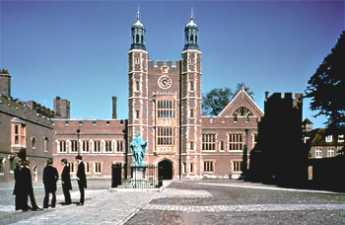 Elite boarding schools may not perceive their proper role, which is a useful one.
Elite boarding schools may not perceive their proper role, which is a useful one.
Remember This Date: May 18
Lower Delaware Bay is teeming with successive migrations of seafood. May 18 is a pivotal day, give or take a few days.
School Vouchers (7)
 Health Savings Accounts,like school vouchers, dislodge government's patronage control over a vital public service. Both of them redirect tax money back to the public, who choose among vendors for themselves. Interestingly, it is unions who seem most threatened by this.
Health Savings Accounts,like school vouchers, dislodge government's patronage control over a vital public service. Both of them redirect tax money back to the public, who choose among vendors for themselves. Interestingly, it is unions who seem most threatened by this.
Seventeenth Amendment
 The consequences of this little-noticed amendment should be re-examined.
The consequences of this little-noticed amendment should be re-examined.
The Coming Baby Boomer Retirement Problem
 In a few years, the baby boomers will retire and two things will happen. They will have to retire later in life, and the country will have to borrow money to pay for the rest.
In a few years, the baby boomers will retire and two things will happen. They will have to retire later in life, and the country will have to borrow money to pay for the rest.
Advanced Placement Gains Attackers and Defenders
 College admission is so competitive it creates vested interests. Everything is questioned, even the value of college itself.
College admission is so competitive it creates vested interests. Everything is questioned, even the value of college itself.
Beginning Social Security Benefits
 All your life you can look forward to the day Social Security starts paying you. But while some folks need to start benefits before age 65, others should delay it for ten years or more.
All your life you can look forward to the day Social Security starts paying you. But while some folks need to start benefits before age 65, others should delay it for ten years or more.
Contemporary Germantown
 "Well," said Bockus, "Every famous surgeon I know, has a house on an island, somewhere. Where's your island?".
"Well," said Bockus, "Every famous surgeon I know, has a house on an island, somewhere. Where's your island?".
Dinner With Hoffa
 The author's mother decided she wanted to form her own opinion of the Teamster's Boss, a couple of weeks before he was disappeared.
The author's mother decided she wanted to form her own opinion of the Teamster's Boss, a couple of weeks before he was disappeared.
Flexner Report, Revisited
 A new book by John A. Kastor compares the doctor-run Cleveland Clinic with the University-run Hospitals of Case Western Reserve under the managed care insurance system. Both hospital systems had plenty of problems, many of them self-inflicted, but it looks like doctor-run is winning the race.
A new book by John A. Kastor compares the doctor-run Cleveland Clinic with the University-run Hospitals of Case Western Reserve under the managed care insurance system. Both hospital systems had plenty of problems, many of them self-inflicted, but it looks like doctor-run is winning the race.
Further Acknowledgments (2)
 Finding a publisher is often hard, but sometimes easy.
Finding a publisher is often hard, but sometimes easy.
State Capitol Think Tanks
 States rights will be neglected as long as state governments remain so second-rate.
States rights will be neglected as long as state governments remain so second-rate.
The Godfather
 The chief thug in town turned out to be quite a wit.
The chief thug in town turned out to be quite a wit.
The Hospital That Ate Chicago (1)
 A flash of inspiration gets a medical article published.
A flash of inspiration gets a medical article published.
Swashbuckler
Your author is probably the only person still alive who attended the Senate hearing of Howard Hughes. There is probably a lot to this story yet to emerge.
Unintended Consequences for Advanced Placement
 The story of how the author complained to his head master about preparation for college and how it led to the concept of Advanced Placement courses in high schools.
The story of how the author complained to his head master about preparation for college and how it led to the concept of Advanced Placement courses in high schools.
Getaway
 The Delaware Hospital in Wilmington once had a real shoot-out.
The Delaware Hospital in Wilmington once had a real shoot-out.
Goat Head Merchant
 A real-life story of bootleggers in a hospital.
A real-life story of bootleggers in a hospital.
Growing Legs
When an entrenched institution, like health insurance, contains basic design flaws, it finds it has always had strange allies quietly defending its flaws. The mark of a really good reform is that it falls so neatly into place in a lot of unexpected ways.
Health Savings Accounts
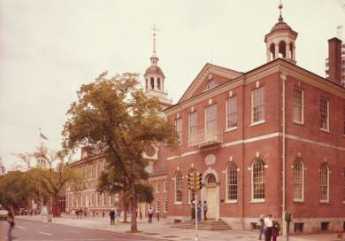 In late 2003, Congress passed and the President signed, legislation enabling tax exemptions for contributions to Medical Savings Accounts. This monumental reform was included in a law which created a number of Medicare prescription drugs benefits which received more attention in the press. Such accounts were renamed Health Savings Accounts, which was the original terminology in 1980 when John McClaughry of Vermont and George Ross Fisher of Pennsylvania, shortly joined by Michael Smith of Louisiana, first introduced the concept.
In late 2003, Congress passed and the President signed, legislation enabling tax exemptions for contributions to Medical Savings Accounts. This monumental reform was included in a law which created a number of Medicare prescription drugs benefits which received more attention in the press. Such accounts were renamed Health Savings Accounts, which was the original terminology in 1980 when John McClaughry of Vermont and George Ross Fisher of Pennsylvania, shortly joined by Michael Smith of Louisiana, first introduced the concept.
Illicit Drugs are Eliminated in Philadelphia
 Every proposal for eliminating illicit drugs has failed except the one Philadelphia used after World War II.
Every proposal for eliminating illicit drugs has failed except the one Philadelphia used after World War II.
Franklin's Admirers on TV
 The author finds himself on television, and wonders whether c-span is a variant of blogging. From that, we go on to question whether Franklin really liked the French.
The author finds himself on television, and wonders whether c-span is a variant of blogging. From that, we go on to question whether Franklin really liked the French.
Hold the Presses
 The Clinton Health Plan was dead on arrival, but the media didn't know that.
The Clinton Health Plan was dead on arrival, but the media didn't know that.
Funny Toes: A Physician Viewpoint
 Most people either ignore funny toes, or hide them in their shoes. Here are one doctor's idle thoughts about them.
Most people either ignore funny toes, or hide them in their shoes. Here are one doctor's idle thoughts about them.
Christmas Reflections
 It once was a tradition to go back to the big city for Christmas shopping..
It once was a tradition to go back to the big city for Christmas shopping..
Christmas Reflections (Podcast)
George Fisher narrates one of his favorite reflections, "Christmas Reflections," on the changing face of Christmas and Christmas shopping in Philadelphia.
Minimum Wage Fangdoodle
 While no one was looking, mandating a minimum wage turned into a contrivance to maintain low-interest rates.
While no one was looking, mandating a minimum wage turned into a contrivance to maintain low-interest rates.
The Palace on Wheels
A sleeper train for tourists, traveling west from Delhi into the heart of the Rajput Princely States of Rajastan. A finer introduction to India cannot be found.